Recent interviews
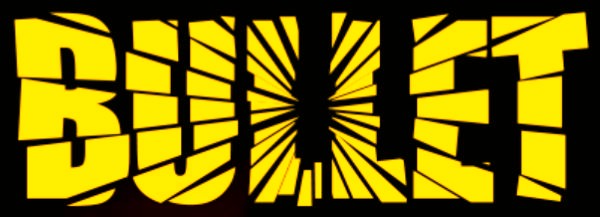
Bullet var tillsammans med rockarna i Ström nyligen ute på en runda i Sverige kallad Småland Rock Tour och när turnébussen gjorde ett stopp i Stockholm så pratade Metal Covenant en stund med båda banden.
Ursprungligen var intervjun med Bullet härnedan tänkt att göras med både sångaren Dag Hell Hofer och gitarristen Hampus Klang, men då den senare var rejält förkyld och knappt kunde prata så satte sig undertecknad ner och startade samtalet med enbart herr Hofer.
Men som så många gånger tidigare så blir saker och ting inte som man tror eller förmodar och någonstans halvvägs genom intervjun så ramlar herr Klang trots allt in i samtalet och stannar därefter till stor del kvar tills att det blir dags för att avsluta snacket för den här gången.
Jag pratade med Hampus i september förra året och då sa han att ni var lite i startgroparna för en ny platta. Är nästa Bullet-platta redan klar att pressas och tryckas?
Dagge: Det är den inte, tyvärr. En viss del får man nog skylla på mig. Jag är seg med sången. Vi har gjort sådana försök innan, när vi bara åkte upp till Solna när vi skulle spela in och så där, ”Nu har vi två veckor sång.” och jag klarar inte av det. Jag kan sjunga några timmar per dag. Det låter så jävla primadonnigt, men det funkade inte helt enkelt, så vi skiter i det. Jag spelar in i replokalen med vår fantastiska trummis. Han kan göra hattar och allt annat också typ. Så vi gör det i lugn och ro. Jag har ett nattjobb och jag åker dit vid 21.30, så vi ses vid 19 och så kör vi ett par timmar. Och jag tycker det blir bättre. Men det drar ut på tiden.
Blir det en rak jäkla Bullet-platta som det brukar vara?
Dagge: Ja, det blir det. Ja, det blir inga stora överraskningar. (Skrattar) Jag hoppas att det blir ännu bättre låtar. Men nej, vi ska inte byta någon stil. Nej, det kommer att kännas igen. Det kommer det.
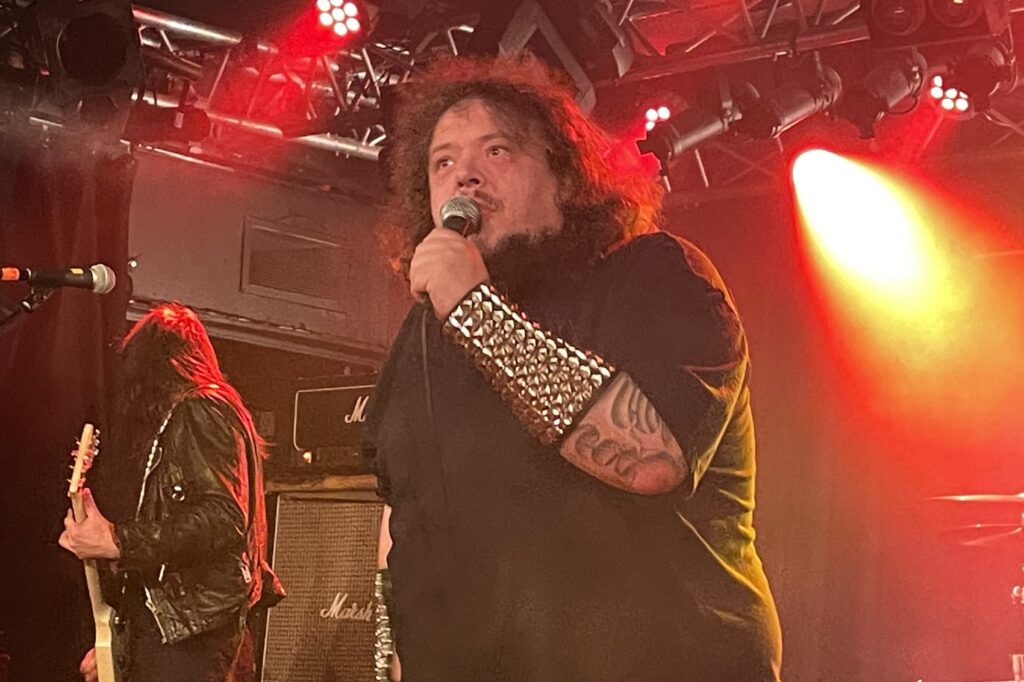
Jag pratade med grabbarna i Ström för någon timme sedan och ställde den här frågan till dem också. Hur skulle en tvättäkta power-ballad låta om Bullet skulle göra en sådan?
Dagge: Ja, vi har ju inte varit där så mycket och tassat än. Men det är väl inget fel i det. Om man gör en bra power-ballad är det väl helt fantastiskt. Men vi kommer ju inte tvinga in en. Men visst, råkar det komma fel på något vis, en svinbra låt, då är det väl inget så där ”Nej, den får inte vara med.”. Alltså, det finns ju fantastiska power-ballader också, och skulle det bli det så är det inget jag är emot. Jag tror att jag inte avslöjar för mycket med att säga att det kommer ingen på denna platta heller.
Pratar ni någon gång om att göra lite mer metal-låtar och gå ifrån hårdrocken ett steg? Bollar ni sådana saker i bandet?
Dagge: Ja, det gör vi. Men jag är ju helt fel person att prata med om att skriva låtar. Jag gör ju inte det. Jag kan ingenting. Men jag har hört när de pratar om det. (Skrattar) Och det är absolut ”Nu vill jag köra mer den här gamla hederliga lite mer rock ’n’ roll.” eller ”Nej, nu ska det bli gammal hederlig heavy metal.”. Men ja, jag vet inte. Jag är följsam i det där. Är det bra så är det bra, tycker jag.
Jag måste fråga lite om texterna. Ni är ju nästan 25 år, ja, inte skivsläpparmässigt, men in i er karriär nu. Hur tänker ni textmässigt så här långt in i karriären?
Dagge: Alltså, jag förstår att det kan uppfattas som väldigt banalt, och det är det väl till viss del. Men det är lite medvetet också. Inte att det ska vara dåliga eller löjliga texter. Hela Bullet handlar väl om att dricka bärs och vilda tjejer, vill vi i alla fall. (Skrattar) Och motorcyklar och bilar eller så där typ. Vi vill hålla oss till det. Självklart vill man ha det fyndigt, och smarta texter, men det ska inte handla om tusen andra grejer, som politik och typ stora frågor. Så det är väl ändå ganska medvetet. Men igen, måste jag väl säga, jag gör väldigt lite texter också. Jag apar mig och sjunger. Min grej är ju det.
Är det klart på vilken label ni kommer släppa? Kommer ni ligga kvar på Steamhammer efter så här lång tid?
Dagge: Ja, det kommer vi.
Är det någonting, förutom kontraktsmässigt, som fäller avgörandet varför ni använder er av dem?
Dagge: Vi vill ha ett bolag som vi kan samarbeta med och som tycker det är roligt att samarbeta med oss. Äh, det är ju bara klyschor, men så är det ju. Hellre ett lite mindre bolag som tycker att vi är stora och viktiga än att komma på ett jättestort bolag som tycker ”Ja, vi plockar upp tusen artister och sedan så ser vi om någon kanske gör något bra, men det får de bevisa.”. Och det vill vi väl bevisa också, men hellre då att man har lite mer fria tyglar och att man får köra på med sin grej. Eller att vi typ inte har en deadline, eller det har vi väl på något vis också, men vi är ganska fria. Men vi har ju sagt nej när de sagt ”Ja, nu måste det komma ut.”. Då har vi sagt ”Men vi har inte tillräckligt bra låtar än.” och då skjuter vi på det hellre. Hellre en sen platta än en dålig platta, helt klart.
Men nu har det gått många år sedan förra plattan. Svider det i ett skivsläpparbands hjärta?
Dagge: Nä. Jag tycker det är ganska stressigt att släppa skivor. Jag gillar inte alls det. Jag gillar inte att spela in och sådant. Jag tycker om att spela live. Ja, och sedan försvann så mycket med den här jävla coviden, när vi hade en ganska ny platta. Ja, det var väl fullt ös, det gick bra, vi åkte till Japan, det kändes stort, ny mark för oss, och ja, det var precis efter vi kom hem, det handlade om veckor innan de slog igen hela världen. Så det kändes lite surt, för det var mycket jobb, och det är lite stressat hela det här med att göra en skiva.
Så nu säger jag en sak som du förmodligen inte kommer att svara på. Nu behöver jag bara ett datum för släpp och en skivtitel av dig.
Dagge: Alltså, det är inget ens jag försöker hemlighålla. Jag har ingen aning om något av det. Faktiskt helt sant. Jag tror inte ens vi har ett arbetsnamn än. Nej, det kommer lite senare i processen.
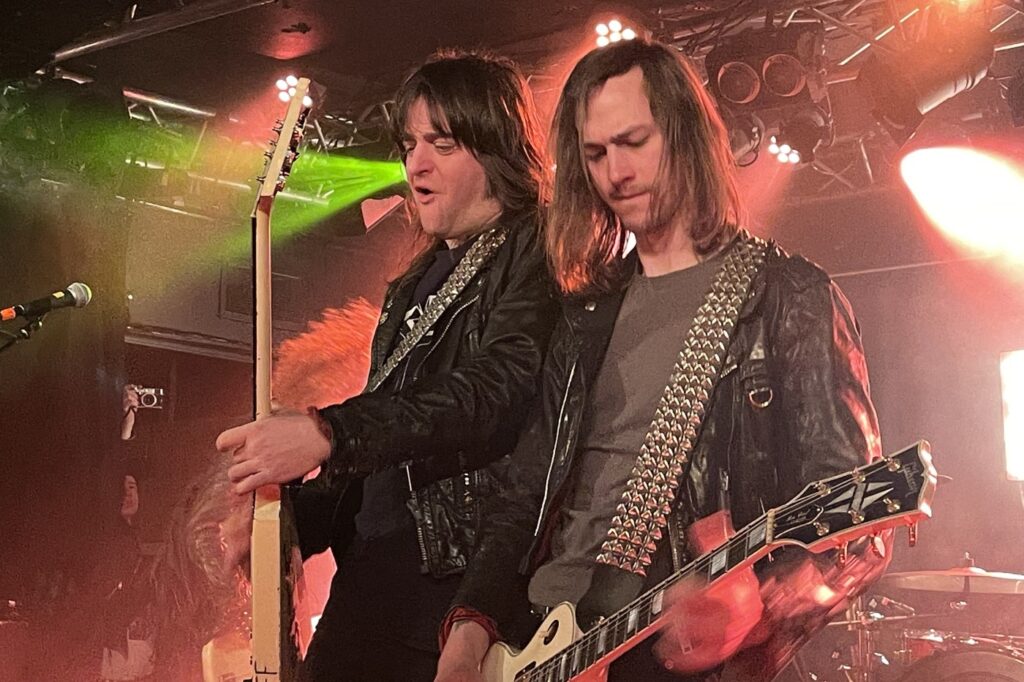
Freddie Johansson. Är han er permanenta andra gitarrist nu?
Dagge: Ja, det är han.
Tre av er har ju lirat i snart 25 år tillsammans. Och så har vi Gustav (Hector), som ni kände sedan innan, som har lirat i ungefär åtta år med er. Men så kommer det en ny grabb nu. Hur går en så kallad rekrytering och en process till när man ska få någon in i ett sådant band som ni är?
Dagge: Det går så här: att när det är någon som inte pallar trycket och har hoppat av så får alla en svår depression och så sitter alla och gnäller om att det är tråkigt att ”Fan, vi måste hitta en gitarrist.”, eller vad det nu är som felar. Och sedan kommer vi inte längre än det förrän Hampus hittar någon, och så tar han med dem. Med alla är det så, med Gustav och med Ben (Healey), med alla.
Hampus: Med Freddie var det faktiskt jävligt konstigt. Min farsa körde lastbil och var ju typ uppåt landet någonstans och körde en teater. Och han som var med och jobbade och roddade den här teatern var Freddie. Sedan när de hade rast så satt de och babblade och så började farsan prata om Bullet och att vi letade efter en gitarrist, och då sa Freddie ”Åh fan. Jag är gitarrist.”, så då fick han numret då.
Dagge: Det här har jag inte hört heller. Och det var verkligen ingen kritik. Det är väl svinbra att någon tar tag i grejer, att man inte bara sitter och bara ”Nu måste vi, nu måste vi.”. Nej, det är fan bättre att någon bara gör något.
Men Bullet är ju ändå, om man säger, hundra procent rock ’n’ roll / hårdrock, så skulle man kunna klara sig på en gitarrist?
Hampus: I vissa låtar skulle det gå. Men låtarna är ju gjorda för fler gitarrer.
Dagge: Nämen alltså, det låter ju tunnare givetvis. Och ändå så hade man fått ha en svinbra syntspelare som bara täckte upp allting. Nej, det går inte. Det ska vara fem stycken i ett band.
När ni bygger en setlist idag, känner ni att det är många låtar som ni bara måste spela? Alltså, vissa specifika, klassiska låtar som Turn It Up Loud. Eller känner ni att ni kan börja blanda in lite mindre kända låtar från de gamla skivorna i er repertoar??
Hampus: Det är lite så här, att de låtar som är släppta som singlar och videor känner ju mer folk till. Så då märker man ju att kör man någon lite mer okänd låt, som vi kanske tycker är bra också, så får den ju inte samma uppmärksamhet. Och oftast är ju singellåtarna de bästa, så de vill man ju gärna köra så många som möjligt av liksom. Sedan kommer det ju till lite på varje skiva och så där. De självklara hitsen vill man ju ha med liksom, tycker jag i alla fall.
Dagge: För mig handlar det lite om att jag är så jävla tröglärd med, så jag tycker det är ett stort moment. Det är ju som att lära sig en ny låt, att lära sig en riktigt gammal låt vi inte är inrepade på. Jag tycker om när det bara är sådant man har i ryggmärgen nu nästan. De låtarna vi har spelat i 10–20 år går ju rätt automatiskt.

Angående Bullet-ljusriggarna. Hur mycket tid och pengar kostar det att hålla de där grejerna igång?
Hampus: Att hålla dem igång är ju inga jättesummor. Vi har ju totalrenoverat dem. Min granne har hjälpt till lite. Det var lite bök att få tag i originalglödlampor och sådant. De är ju tuffare, de gamla. Men det var ett jävla jobb att bygga den stora ljusskylten. Det tog tid. Men det är väl inte så farligt.
Dagge: Men den stora är sjukt snygg också. Mer tid än pengar ändå.
Så har vi bussen då. Håller den måttet fortfarande? Går den igenom besiktningen varenda gång?
Hampus: Den är besiktningsbefriad, så den behöver inte besiktigas. Den är ju över 60 år nu. 61 år, så den har fan inte varit besiktigad på 10 år nu. Innan var det ju var 12:e månad på tunga fordon. Inte som för veteranbilar. Så det var skitjobbigt att besiktiga den då. Så det är ju skönt att slippa det.
Hur länge håller den till då? Har ni någon prognos?
Hampus: Nä, men alltså, den håller ju för evigt. Det är bara hur mycket man orkar lägga på den liksom. Men idag har det gått jävligt bra.
Dagge: Det är ju Hampes kärleksbarn till stor del. Alla älskar den lika mycket, men det är ju han som gör allt jobb och tar tag i det. Nu är det så igen, att jag berättar om hur lat jag är.
Hampus: Ja, det är ju så också.
Iron Maiden har Eddie. Bullet har bussen. Så jäkla många band är det inte som har en sådan här grej som typ alla vet om.
Hampus: Men många är ju så här: Var är bussen? Och tycker att det är lika mycket…
Dagge: Och det är ju typ mer lajks på bilder på bussen och sådant än vad det är om det är vi.
Hampus: Så är det. På dig och på bussen. Nämen, den är ju så jäkla snygg. Och det är ju en sådan bra årsmodell där, ’64. Vänsterstyrd, och stora motorn, och runda karossen, och aluminiumkaross som aldrig rostar. Och tvåsystem på bromsarna är det ju. Det var det ju inte på de lite äldre modellerna. Så det är en perfekt årsmodell. Men det är mycket jobb att göra på den. Bakänden ser ju förjävlig ut. Lite så. Så det är mycket smågrejer.
Jag tänkte på en sak när du sa att du inte skriver så mycket låtar och texter. Tycker du att du kan få lite oförtjänta hyllningar från till exempel press och fans från att egentligen ”bara” sjunga?
Dagge: Ja, det frågas ju ofta. Eller de frågar ju ofta mig, och jag har ju ingen aning. Så kan det vara, men ah, jag tillför väl min del också. Jag hade ju inte kunnat göra något annat själv. Sjunga kan jag. Det är det jag kan. Apar mig lite ibland.
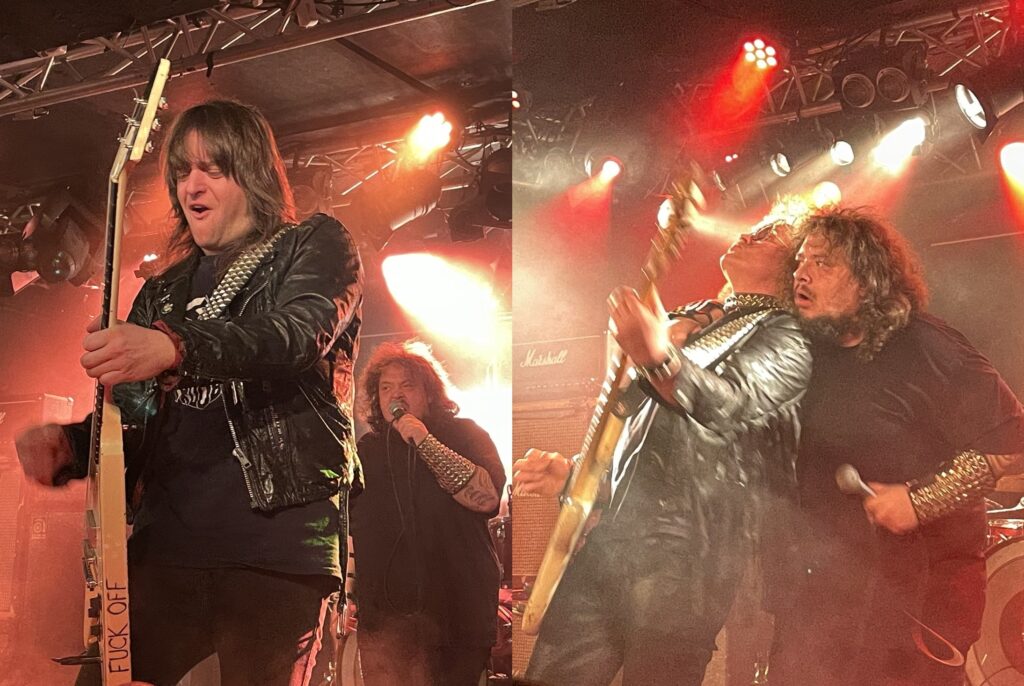
Du sa att det kunde vara lite tufft ibland om du skulle sjunga i en studio. Ni kör visserligen ett ganska behagligt schema här nu med ett helgschema, men om ni kör en lite längre turné, känner du då att din röst alltid fungerar?
Dagge: Ja, otroligt nog gör den det. Det trodde jag faktiskt inte själv från början. Ja, Udo-röst får jag väl kalla det, för det var väl han som var förebilden i det. Men jag vet inte. Distad sång eller så.
Hampus: Du kunde ju knappt prata dagen efter du hade sjungit.
Dagge: Och då kändes det ”Jo, visst, men vi kan spela på helger. Men om vi ska ut på turné då måste det i alla fall vara två lediga dagar och sedan ett gig, två lediga dagar och ett gig.”. Så funkar det ju inte i verkligheten, att göra så. Jag vet inte, men jag brukar få en svacka där tredje eller fjärde dagen.
Hampus: Men vi har gjort 27 gig på 27 dagar. Det är väl rekordet, va?
Dagge: Så det funkar. Det är nästan som man vill ta i trä. Men jag tycker det blir lättare och lättare att sjunga, och jag blir mer och mer sällan dålig i halsen, eller i alla fall så att det påverkar.
Hampus: Det är ju att bli sjuk som är det farliga.
Dagge: Ja, precis. Är man 28 gubbar i en buss när vi är iväg… Det börjar ju på något håll och sedan kommer hostan genom hela skiten. Det är farligt. Men vi har ju inte ställt in många gig på den här tiden. Den funkar, det är skönt, det är glatt.
Som sagt så kör ni helger nu och det är ju verkligen publikfrämjande att köra fredagar och lördagar mot att vara ute en måndag i Stockholm. Så vem kommer med en sådan briljant idé? Vem är det som ligger bakom en sådan idé att köra Smålandsbanden ihop?
Hampus: Jag tror det mest är Zdravko (Zizmond), sångaren i Ström.
Dagge: Det är väl han som har dragit ihop hela denna grej, men i Sverige har vi väl kört ofta att det är helggig eller så där. Det funkar ju inte på samma sätt på en Europasväng.
Hampus: Ja, det blir naturligt lite så. Men visst, vi har ju spelat onsdagar och torsdagar rätt mycket förr i tiden också. Men mest är det fredag och lördag som gäller.
Ni har hållit på länge. Kommer ni göra en sista hårdsatsning på bandet eller nöjer ni er med den nivå ni håller nu?
Dagge: Jag vet inte. Vi har väl alltid kört så gott vi orkar liksom. Alltså, om jag hade vetat att man gjorde en rejäl satsning, då hade jag nog gjort den för 15 år sedan. Jag gör mitt bästa. Det går inte mer än så, tror jag. Eller jag klarar inte mer än så i alla fall. (Skrattar)
Av Tobbe – Publicerad 28:e april 2025

H.E.A.T spelade i sin hemstad Stockholm i slutet av februari och Metal Covenant passade då på att prata med keyboardisten Jona Tee och gitarristen Dave Dalone om nya skivan Welcome To The Future.
Ni har varit en sväng i England i slutet av januari och sedan har ni kört två veckor under andra halvan av februari i Finland, Danmark, Norge och Sverige. Det är ungefär två månader innan nya plattan släpps. Borde inte plattan redan varit ute nu?
Jona: Det är en fråga vi har ställt oss, och det borde den kanske ha varit, ja. Men det vart lite planeringsrodd med det där, för Kenny ska ut med Avantasia också i mars och april, så han är borta. Och sedan ska vi till Sydamerika i maj, som redan var bokat, så det var liksom ”Jaha, det är nu eller så blir det i typ höst.”, så bara ”Fan, vänta. Det var så länge sedan vi körde Sverige.”. Ja, så med facit i hand kanske det hade varit bättre att vänta, men det har varit en bra sväng, fan.
Dave: Ja, det tycker jag. Alltså, man gör det man kan. Man jobbar ju med det man har liksom. Vi kan ju inte trolla fram liksom årstider och skivor och datum och grejer.
Jona: Nej, exakt. Nämen, det tog en stund att göra skivan liksom. Det blev lite förseningar. Fan, var det nio månader det tog? Nämen, det tog ett tag, så att planeringen vart lite så här fuckad och förskjuten. Men ja, du har en poäng i det du påstod.
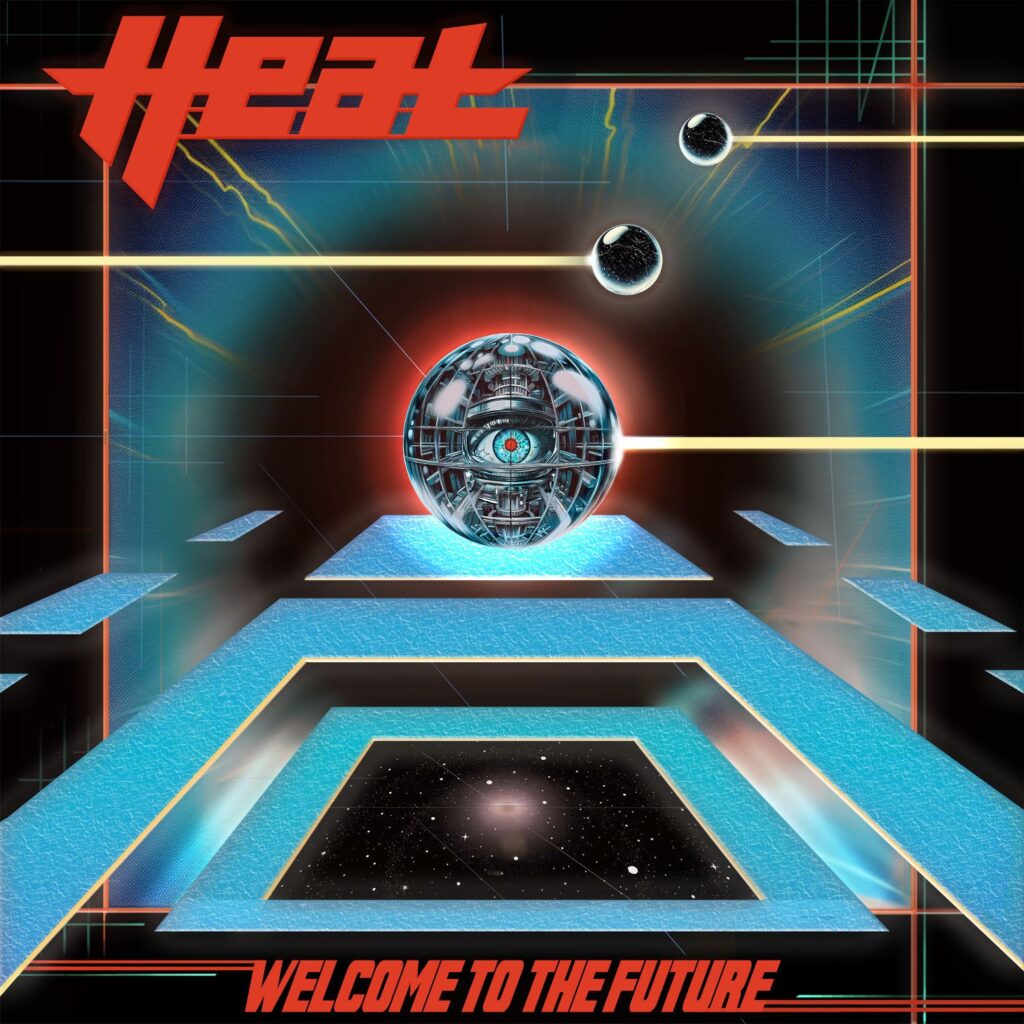
Men till skivan. Den heter ju Welcome To The Future, och då undrar jag: Vilken framtid välkomnas vi till?
Dave: Ett totalt jävla mörker.
Jona: Jamen, det är lite så. Utan att vara på något sätt för deppiga, så fanns det några låtar som hade den vinkeln. Alltså, lite så här halvdystopiska, som ”Var är man på väg?”. Ja, några låtar behandlar den grejen och då tänkte vi att det vart som en bra skivtitel liksom.
Dave: Vi lever ju i ganska spännande tider nu, känns det som. Det är väldigt mycket som händer, liksom på alla fronter och kanter. Det känns som att vi står inför ett skifte eller en ny tidsålder på något sätt. Och vem vet vad det innebär liksom?
Jona: Disaster handlar lite om den grejen också. Det här med ekokammare. Alltså, folk har sina egna versioner av verkligheten liksom och det är svårt att säga vad som är rätt och fel. Det är klart att det finns saker som är på ett sätt, men det finns många olika… Jag vill inte gå in på för mycket detaljer.
Dave: Det finns många olika tolkningar av sanningen.
Jona: Jag brukar säga ’flat earth’, att tillräckligt många tror och säger att jorden är platt fast det är bevisat med vetenskap att den inte är det. Och då kan man ju också ifrågasätta vetenskap. Det kan man ju också ifrågasätta om man vill, och säga ”Vad då vetenskap? Vad är det för något?”. Förstår du? Det finns så många olika versioner av sanningen liksom, medan det finns en empirisk sanning.
Dave: Det finns en definitiv sanning.
Jona: Precis. När det kommer till universums beståndsdelar och så där. Det är ren och skär jävla vetenskap liksom. Men säg att ”Det där är inte lila.”. (Pekar på en lilafärgad mugg.) Lila är en färg som inte existerar. Det är bara en grej som hjärnan fyller i, på riktigt, läste jag om. Men vem vet om det är sant? (Skrattar) Nämen, du förstår hur jag menar. Det är lite sådana där grejer. Och det är en del av det. Det är rörigt.
Dave: Och sedan så har ju hela informationsflödet förändrats också, och, jamen, narrativet liksom. Var kommer verkligheten ifrån egentligen? Och vem är det som presenterar den för oss? Det har ju förändrats lite grann, får man väl ändå säga. Och det tillhör väl den nya framtiden på något sätt.
Jona: Jag tror folk fattar vad vi menar liksom, utan att behöva gå in för specifikt på någonting. Man ska ju ha en cool titel också till slut. Vi har faktiskt en låt som Kenny har gjort som heter Welcome To The Future som inte var riktigt klar. Vi bara ”Fan, vi släpper den senare.”. Kanske på nästa platta som en cool grej liksom.
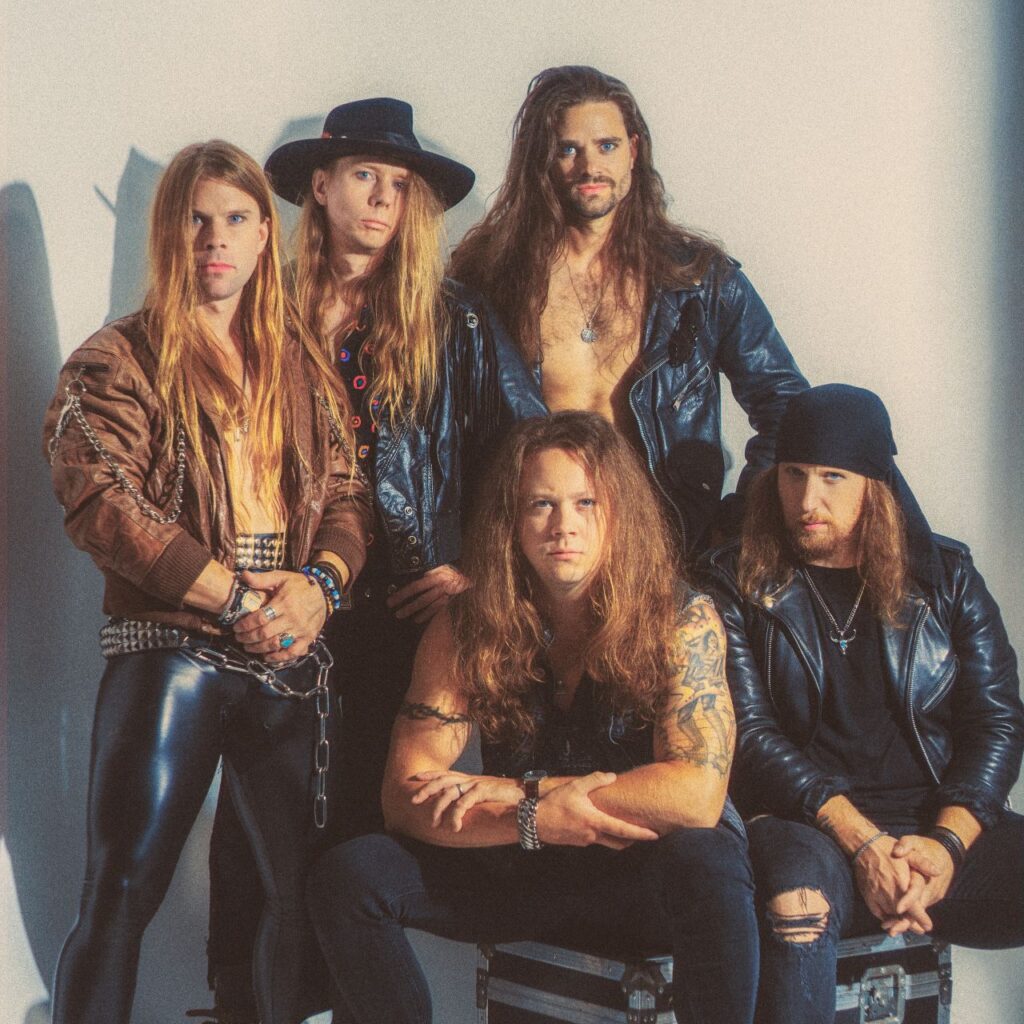
När jag tittade på låttitlarna förut så bara ”Många av de här låttitlarna känner jag igen från 40–50 år tillbaka.”. Det är Rock Bottom, Rock ’N’ Roll Rebel, inom parentes visserligen, Children Of The Storm, Paradise Lost. Förklara de här titlarna. Har ni…
Jona: Paradise Lost har ju varit med länge. Alltså, många tusen år nu. Children Of The Storm: Vad då? Finns det en annan låt som heter det?
Ja, av Virgin Steele till exempel. Men min fråga var egentligen: Har ni tagit inspiration eller har ni lånat eller är det en slump?
Jona: Slump. 100 procent slump.
Dave: Jag tror att det är lätt hänt liksom när man söker sig åt samma håll med skapandet.
Jona: Det var väl (Viktor) Diaz, en gitarrtekniker… Han visade Rock Bottom med… Va fan, vilka var det då? Var det Blue Öyster Cult? Nej, vad fan var det? Det var något gammalt band.
UFO kanske?
Jona: UFO. Exakt. Och jag bara ”Jaha, det här är Rock Bottom. Aldrig hört i hela mitt liv.”. Men ’rock bottom’ är ett vanligt uttryck, som ’when you hit rock bottom’ liksom. Nämen, det är ingen tribut på det sättet eller att man har tagit efter eller lånat, utan det är fan bara slump. Alltså, vi har ju titlar som, fan, Emergency. Det finns väl 50,000 låtar som heter det liksom.
Dave: Alltså, ibland tänker ju vi att ”Det här kan vi inte döpa låten till.”, för att det blir en krock, liksom omedvetet att man kommer på det. Men jag tycker fan att sådant är okej ändå alltså. Om låten har sitt eget ID och den tjänar på att ha det namnet, att det är det bästa namnet för låten, då tycker jag att man får skita i det alltså. Jag tycker det är okej.
Jona: Alltså, i slutändan är det säkert bara coola ord och grejer man har snappat upp från någonstans liksom. Kanske inte alltid från andra band, utan från serier eller vad som helst man har sett.
Hur, eller på vilket sätt, tycker ni själva att er musik känns fräsch än idag?
Dave: Tycker vi ens det?
Jona: Jag tycker ändå att den har en uppdatering från 80-talet. Men samtidigt, med den här skivan har vi ju kanske gått lite ännu mer 80-talet än typ på väldigt länge, framför allt med singelvalen som vi gjort. Det blir också så här: om du väljer fyra singlar, som vi har gjort nu, som har mer 80-tal i sig, då blir hela vinkeln på releasen mer 80-tal liksom. Vi hade kunnat välja typ We Will Not Forget, Paradise Lost och In Disguise. Du vet, sådana här lite mörkare låtar. Då hade det ju blivit en helt annan vinkling på plattan liksom. Sedan är ju omslaget, som Dave har gjort faktiskt, jävligt 80-tal. Det är ballt.
Jag tänkte faktiskt fråga just om omslaget, för när jag tittar på omslaget så ser jag att det känns modernt, men ändå gammalt. Det är fler band än ni som har gjort så på senare år.
Dave: Jag tror att hela 80-talsgrejen har ju ändå varit ganska populär de senaste tio åren. Ja, synthwave och retrofuturism och allt det där med hela det estetiska och visuella uttrycket liksom. Så det är väl så att saker och ting går i cykler.
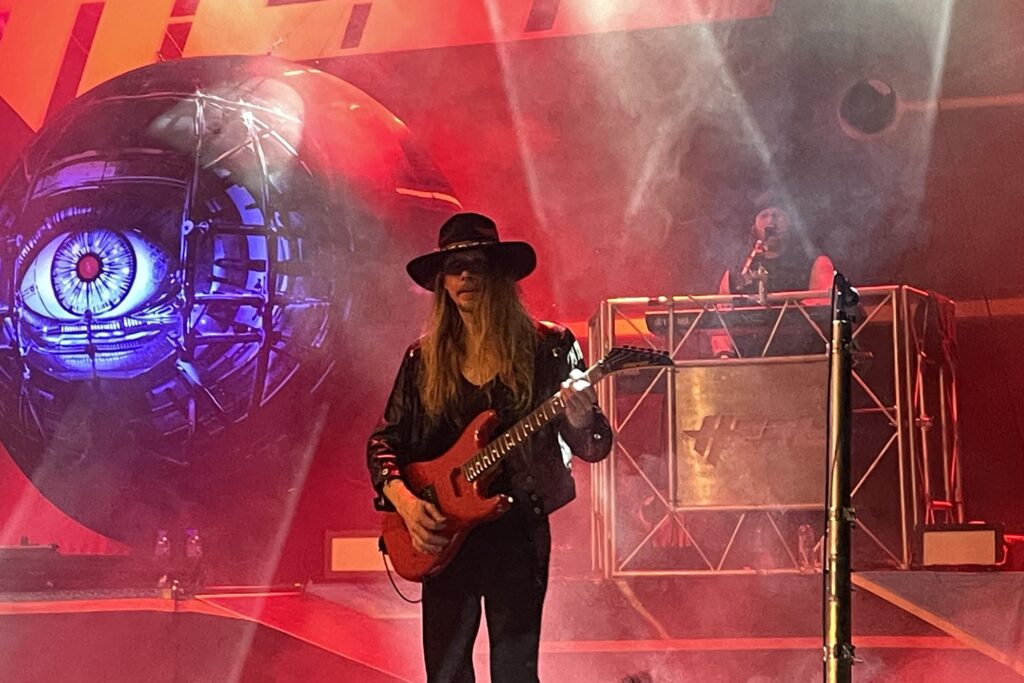
Hur svårt eller hur lätt är det nu att hitta melodier så att man inte traskar alltför mycket i samma riff som det är lätt att hamna i?
Dave: Det svåra är att själv bli imponerad av det man gör, tycker jag. Och det är, tycker jag, ett krav om man ska skapa någonting, att man själv får ut någonting av det. Det är väl det som var utmaningen lite grann, att inte känna att ”Fan, det här har jag gjort redan. Varför göra det igen?”. Man får hitta små infallsvinklar som man inte tidigare undersökt. Det är så man får göra liksom. Och mycket är det i detaljerna när man gör saker, att det är det som får det att kännas intressant egentligen, att få helheten att bli intressant.
Jona: Och sedan tycker jag också att texterna börjar bli viktigare. Hur man kan blåsa liv i en låt genom att hitta en story liksom, och att det handlar om någonting, då får det en helt annan mening. Även om riffen kanske känns gjorda och melodierna känns gjorda så är det så här ”Ja, fast nu berättar jag min story med det här uttrycket.”.
Dave: Sedan är det ju schysst också, liksom att vi ändå har hållit på ganska länge, att Jona har ju sidoprojekt och så där, och jag jobbar ju på lite andra grejer, men man får väl hitta andra kanaler om man kanske vill göra annat. Vi turnerar ju också och då blir det som en katalysator. Man vill hålla den här maskinen igång, så det blir en grej med att man är ett turnerande band. Det är också en del av skapandet, tycker jag, alltså som en motivationskraft för att inte loket ska stanna.
Jona: Ja, H.E.A.T känns som det mest riktiga man har. Som Dave säger, det är det vi turnerar med och det är det man liksom jobbar med och till stor del lever på.
Vad betyder en ny skiva för er personligen? Finns det kvar den här nervositeten det fanns inför ett skivsläpp förr i tiden? Finns liksom ungdomsentusiasmen kvar? Vi kan börja med Dave.
Dave: Inte så jättemycket egentligen vid själva släppet. Jag är ju mer intresserad av resultatet när skivan är färdig. Det är väl det som betyder någonting egentligen. Om det är bra eller dåligt. Alltså, om jag själv tycker det är bra, då vet jag att någon annan kommer att tycka att det är bra liksom. Det är spänningsmomentet, tycker jag, när allting är klart och så där, ”Fan, är det här bra? Gillar jag det här?”. Sedan är det alltid kul att höra folks åsikter. Och ibland kanske man är lite mer osäker, ”Är det verkligen så bra som det kan vara?”. Det blir ju alltid lite spännande att höra vad folk tycker. Men jag försöker att inte ta så stor hänsyn till vad omvärlden tycker om det, utan det är mer en interngrej liksom.
Och samma fråga till dig, Jona.
Jona: Jag är mer hands-on med releasen. Alltså, jag jobbar med sociala medier, kollar Spotify och så. Jag är inte nervös. Absolut inte. När jag känner mig trygg med en release, då spelar det inte så mycket roll egentligen vad det blir, för det här tycker jag är bra och det här tycker jag är kul att få släppa. Och det tar bort lite spänning. Jag tror att i början var varje låt så jävla viktig. Allt du skrev. Fick du någon minsta kritik, då var det som att någon bara slog en i fejset liksom. Nu är det så här, om någon säger ”Jag gillar inte den här låten.” så ”Okej. Jag bryr mig inte.”. Jag tyckte det var bra. Jag kanske inte gillar den här låten om fem år, men nu tycker jag det här är bra. Det är ingen stress. Det är bara kul att få ut skiten.
Dave: Förr i tiden var det kanske lite större att släppa en platta. Jag vet inte, men det känns som att det var det. Nu för tiden släpper ju folk mycket låtar, och det är digitalt, men den här albumgrejen är någonting som tillhör det förflutna egentligen, alltså i mångt och mycket. Fast den ju fortfarande finns, framför allt inom hårdrock. Folk köper fortfarande skivor och liksom supportar och allt det där. När vi startade var det nog en större grej generellt sett att släppa skivor.
Jona: Jag kommer ihåg när vi fick första plattan i handen utanför Playground. Det var helt sjukt stort liksom. Faktum är att det var fan lika stort nu när vi fick Welcome To The Future också. Man tar upp den och bara ”Yeah. Fan vad nice.”. Det är så kul att hela den här skivan liksom är helt in-house-gjord också. Producerad, omslag, mixad. Allt förutom mastringen. Helt skrivet i bandet också.
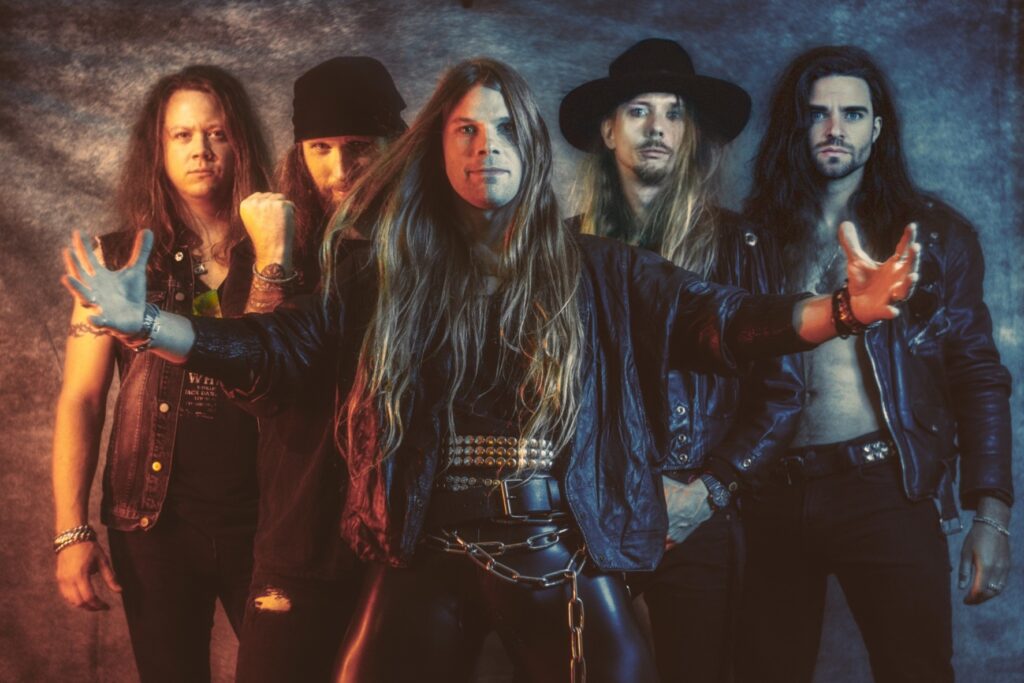
Jona, du som skriver mycket av låtarna och sitter i din egen studio med resultatet och mixar allting. Har det känts lockande ibland att trycka in lite mer keyboardbaserad musik i H.E.A.T, även fast det ändå är keyboard? Alltså, lyfta fram den lite mer, eller mixa upp den lite kanske.
Jona: Fan, vi öppnar ju plattan med Disaster. Det är ju syntintro. (Skrattar) Men H.E.A.T:s musik är jävligt gitarrbaserad. Jag brukar ju dubba upp gitarrerna mycket med mackor och orgel för att snarare förstärka gitarren liksom. Det är lite Europe över det, kan jag tycka. Kanske inte The Final Countdown, men just att dubba gitarr och synt. Nämen alltså, det beror på vilken låt det är. Det är ingen som har något emot det. Dave gör ju också sjukt mycket syntgrejer och jag skriver många av mina grejer på gitarrer liksom, så det är inte så att vi är helt låsta vid våra instrument. Men är det någon låt som behöver mycket synt så ska det vara det. Men Dave brukar säga ”Ha inte för mycket synt nu. Vi måste ha mycket gitarr.”. Nä, jag skojade. (Skrattar)
Dave: Nej, verkligen inte. Jag brukar fan vilja ha mer synt.
Jona: Ja, du gillar mycket synt. Jag gillar inte så mycket synt. Det ska vara lagom liksom, om det inte ska vara mycket, på något intro eller så där.
Hur mycket bollar ni idéerna fram och tillbaka när ni spelar in grejerna?
Jona: Jomen, vi bollar en del. Man har en idé och sedan så kastar man upp den i gruppen. Ibland får man inget svar alls och ibland får man ”Åh, det här var bra.” eller ”Refrängen var bra, versen var tråkig.” eller vice versa. Och sedan så kanske man hittar på något nytt, eller så kommer någon annan med någon idé, så man liksom bollar lite fram och tillbaka. Det är väldigt sällan, om inte aldrig, som vi står i en replokal och typ jammar ihop något. Det är en vision, en utopi. Det är inte för oss. Men man tar hänsyn till varandras idéer. Och så sent som efter vi har lagt trummor på plattan så har vi bytt refränger på låtar. We Will Not Forget gjorde vi det med. Vi hade en refräng, den var bra liksom, men. Vad fan hette den då? Den hette någon annat.
Dave: Judgement Day.
Jona: Och någon dag hade Kenny och Dave fått feeling i studion. Jag kommer in på morgonen och bara ”Va fan. Har de våldtagit min låt nu?” och så slänger jag på refrängen och bara ”Jävlar i helvete vad bra det är! Fan vad fett!”. Fan, fortfarande min favoritlåt på plattan.
Dave: Jag tycker framför allt att vi har blivit mer lyhörda mot varandras idéer, alltså ju äldre vi har blivit. Vissa saker får man ju kriga lite mer för om man vill få igenom det.
Hur orkar man ha kvar drivkraften när man har gjort en sak i så många år?
Jona: Jag driver ju mycket. Det är för att jag aldrig går ur drift. Hjärnan är konstant igång liksom. ADHD kanske? Jag vet inte. Jag får gå till en läkare. Nej då, men det är väl kugghjulen bara. Det snurrar på. Alltså, jag får lite panik om det inte händer något liksom. Så ”Nu ska jag skriva till H.E.A.T.”, då går jag in i den zonen och så börjar jag skriva massor och sedan får man dra i de andra ett år tills de börjar skriva. Jag tror man måste ha någon som är lite mer motor i bandet och har lite damp.
Dave: Min driftkraft ligger nog mycket i att bryta ny mark. Det går ju inte alltid hand i hand med att hålla på med samma sak i 20 år.
Jona: Det var därför du var så jävla pepp i början kanske. Den här 80-talsgrejen, det var ingen som gjorde det när vi började skriva där 2004 liksom. Då började vi med 80-talsprylen. Började lyssna på Out Of This World liksom. Men då fanns det inga som gjorde det. Sedan så lånade vi liksom Kenny from Trading Fate. Vi snodde honom när vi kunde.
Dave: Men det finns ju mycket saker man kan göra i ett band förutom att skapa musik, som design och saker. Det är också ett sätt att liksom hålla sig själv driven. Bygga gitarrer, designa saker, göra intervjuer, vad som helst liksom.
Jona: Dave har ju varit djupt inne i en Kramer-psykos
Dave: Ja, det har pågått i ett par år, ja. Jag kommer inte gå ur den.
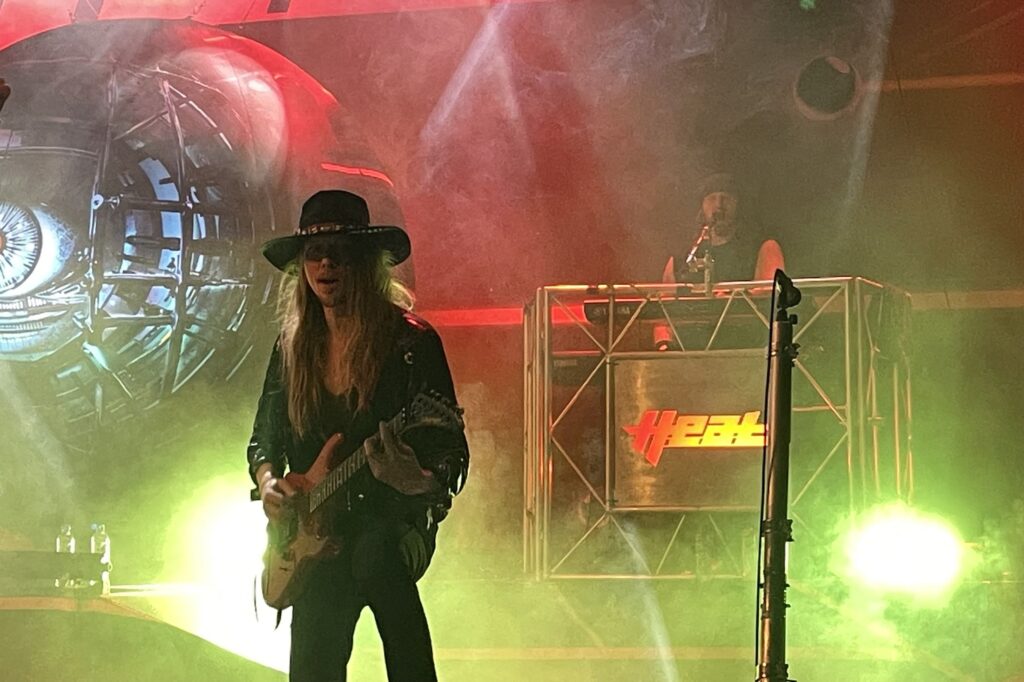
Hur ska en ny skiva kunna spränga sig in bland de klassiska låtarna redan nu?
Jona: Jag vill tro att vi inte är där än, där våra nya släpp bara känns slentrian och bara för att. Jag vill ändå tro att vi fortfarande skapar saker som är bra och som folk kan gilla nu. Som när Iron Maiden kom 2006 och så vill man höra klassikerna och så spelar de hela nya plattan och man bara ”Eh.”. Jag vill tro att vi inte är där. Jag vill tro att folk kommer idag och blir peppade på att få höra Disaster liksom. Och det har vi ju fan märkt på giggen. Folk är på hugget liksom. Det finns ett intresse för det aktuella fortfarande.
Dave: Jag vill tro att vi inte är ett sådant band som har haft en topp där många lyssnare har varit i en viss ålder och fastnat för en viss era, utan jag tror att vi är mer av ett entusiastband där folk har dragit sig mot oss på grund av att de gillar den här typen av musik, oavsett vilken ålder de har eller vad det är som går på radion. Jag tror att det är mer åt det hållet faktiskt.
Jag måste bara fråga dig ett par korta frågor, Jona. Hur går det med nästa Crowne-skiva?
Jona: Jag ska vara klar med den här i mars, har jag sagt till Frontiers nu. Det var mycket som var klart redan förra året. Alex (Strandell) håller på att lägga sång nu och John (Levén) ska komma nästa vecka och dunka in basen. Alla trummor är klara, alla kompguror är klara och alla solon är klara, så det är bara att få in sången och dunka på köer och basen liksom, och sedan så är det klart. Alla låtar är klara och så där. Jag vet inte när den kommer, men i höst kanske.
New Horizon då? Om jag känner dig rätt så har du redan en handfull demoer i bakfickan.
Jona: Ja, det finns ett par. (Skrattar) Jag får väl ta upp det med Nils (Molin), men vi har ju sagt att vi är sugna på att göra någonting till. Jag lyssnade fan lite på den senaste plattan igår. Jag är fan jävligt nöjd med den. Första är bra, men den andra har mer substans liksom.
Så du kommer vilja fortsätta med Nils? Inte för att jag ifrågasätter det, men du bytte ju sångare efter första plattan, visserligen av en slump.
Jona: Ja, det tror jag. Det hade varit jävligt kul. Det vart så jävla bra. Så nu får vi se om allt funkar. Jag tror han är pepp också.
Av Tobbe – Publicerad 23:e april 2025
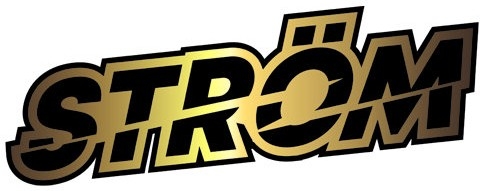
Kvintetten Ström var nyligen ute med Bullet på en gemensam vända genom Sverige kallad Småland Rock Tour och när banden stannade till i Stockholm så passade Metal Covenant på att prata en stund med respektive band.
Nedan följer intervjun med trummisen Tomas Salonen och bassisten Adam Butler från Ström.
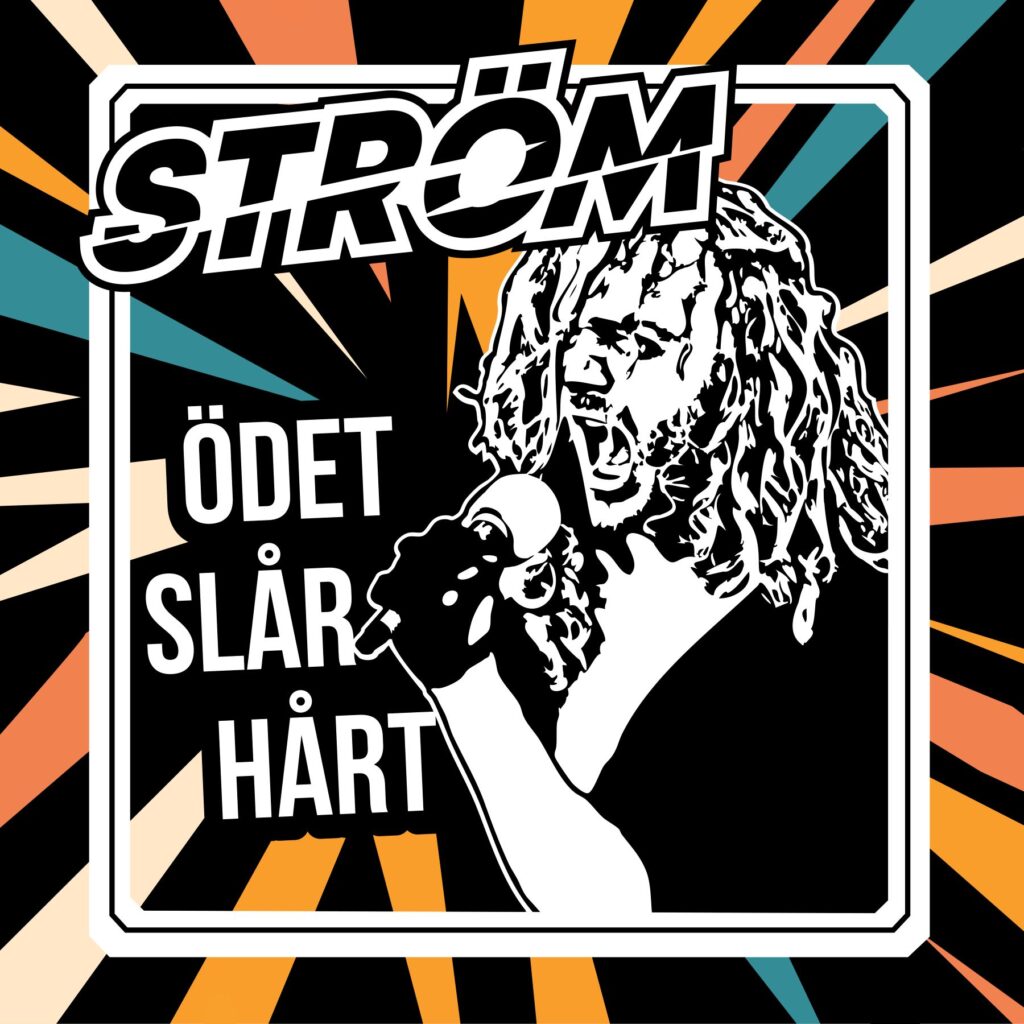
Ni släppte ju nyligen en ny låt, Ödet Slår Hårt. Kan ni berätta lite om just den låten?
Tomas: Kan vi det? Ja, alltså rent sakligt, Johan är ju den som har egentligen skrivit själva musiken till den. Sedan är ju texten hyfsat självförklarande eller så. Jag tolkar den som att det inte alltid går som man vill. Men då får man fan ta det också.
Adam: Det slår hårt ibland när det liksom skiter sig, men jag tror också på mitt öde, att man kan också styra det. Alltså, ja, det är en dubbelmening där liksom. Men det var en sådan här väldigt självklar låt, för Johan skrev den och liksom gjorde en demoversion med trummor och bara skickade och det är exakt så den låter. Så det var inget så här ”Ja, ska vi kämpa lite där i sticket?”, utan det var ”Jättebra. Tack.”. Så den var tacksam.
Tomas: Den föll ju in i Ström-filtret direkt liksom. Och det är en jävligt rolig låt att spela, tycker jag. Just nu när den har börjat lossna liksom, för det här är ju första turnén som vi har haft med den. Så det är ju lite av en promotionsgrej för turnén med. Men sedan, även på den singeln så har vi en B-sida med, Bedövar En Stund. Vi kände att ”Nämen, den ska inte vara med på Orkan-skivan, men den måste ändå vara med någonstans.”, så då kände vi ”Jamen fan, det här blir ju en given grej att ha med.”. Den släpps inte på någon skiva, utan det här är exklusivt för detta liksom. Alla vet ju vad en vinylsingel innebär. Det är ju en tuff grej. En 7:a liksom.
Adam: Och den finns ju inte digitalt, så länge inte någon har rippat den då och delat den på YouTube. Men Ödet Slår Hårt har väl fått jäkligt bra respons och den har varit kul att spela live. Så skitrolig låt att släppa. En klassisk liksom öldrickarlåt. Gött gung, tycker jag.
Som ungefär övriga Ström-låtar.
Tomas: Ja, alltså, till 95 procent så har vi ju låtar där man faktiskt blir glad eller så. Sedan har vi ju allvarliga stunder, absolut. Alltså, Ensam Är Stark och alla de där liksom, men mestadels så är det ju att folk ska få en fredagskänsla även en måndag liksom.
Och nu vill jag veta om det här också är startskottet till att skriva ännu fler låtar till en kommande Ström-platta.
Tomas: Vad tror du svaret är på den?
Jag skulle säga att det är ja, men du får utveckla det själv.
Tomas: Nämen, vi håller ju på. Visst, turnén går väl mest i prioritet just nu. Jag tror Adam har skickat in fyra eller fem idéer. Alltså, vi skickar ju in idéer hela tiden och vi håller på med en ny platta, ja, absolut. Det gör vi hela tiden i och för sig.
Adam: En platta är ju alltid målet, men vi ser inga datum, inga år. Så är det, men självklart så är ju detta startskottet för skiva tre. Sedan om det blir så att vi skriver tio låtar som alla är bättre än Ödet Slår Hårt, så ”Nämen, den hamnar inte på skivan för de här tio är bättre.”, ja, det är ju ett drömscenario. Men absolut, skiva tre kommer ju komma.
Ja, det är ju en smaksak om man vill låta en låt leva sitt eget liv eller om man ändå tycker att den måste få mer utrymme på en skiva.
Adam: Det är ju rätt kaxigt att släppa en singel och inte ha med den sedan, att tro så mycket på den. Eller så skäms man så mycket för den.
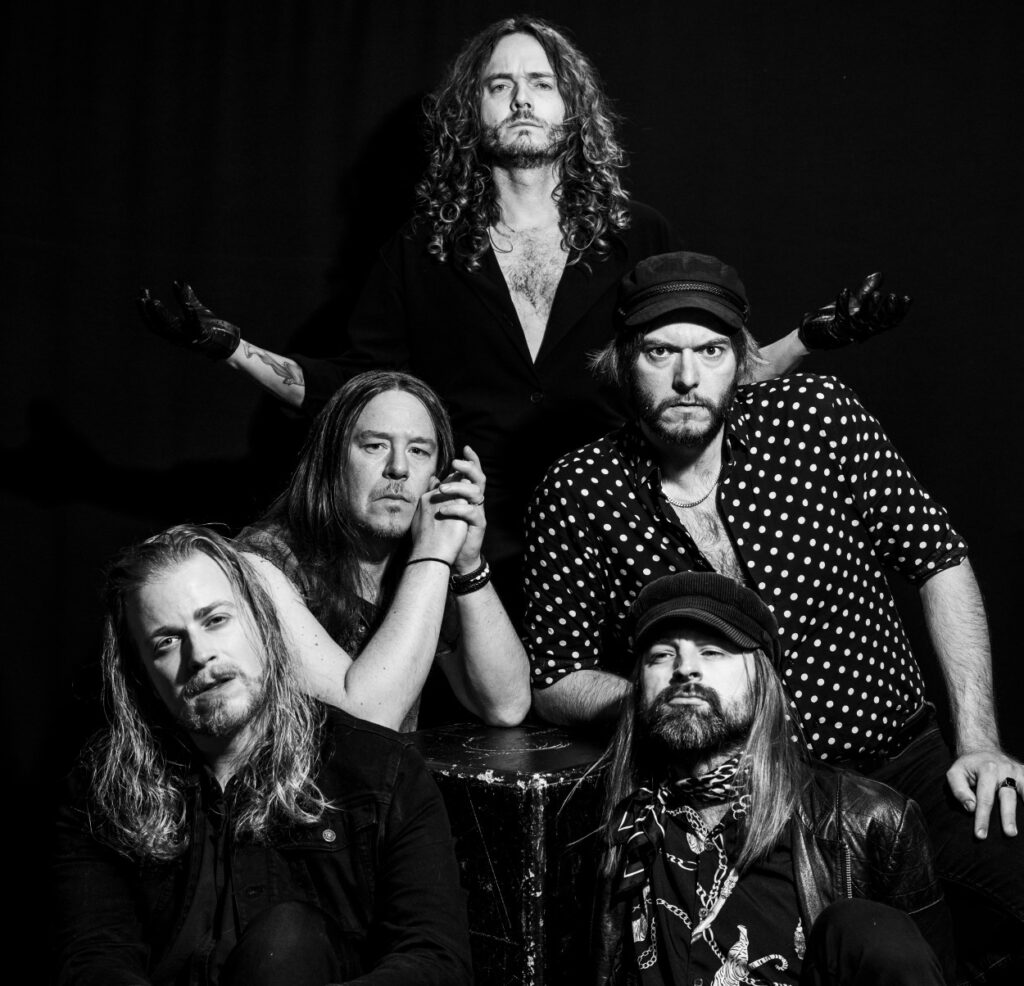
Vi kan väl konstatera att de två första plattorna, som med många band, är ganska lika varandra. Det är samma musikstil. Funderar ni på att på något sätt försöka ändra er musikstil lite? Eller är det en för stor risk att ta, med risken då att man kanske tappar vissa av fansen om man breddar sig lite? Hur funderar ni inom bandet på det?
Tomas: Rent generellt, och vi pratar inte bara om musiken, nu låter det här så jävla kaxigt, men vi är ändå i det stadiet där vi har varit med om mycket. Vi har varit med om många band. Vi är inte rädda för några risker. Jag tror fasen vi skulle kunna ställa upp i Mello liksom. Du vet ”Men vad fan? Det har jag aldrig gjort.” och ”Nämen, okej, vi kör den grejen.”. Och samarbeta med någon, absolut.
Adam: Nu ska jag inte tala för alla, men synten kommer inte komma in. Det kommer inte bli synt. Men att öppna upp för allt från samarbete, spekulationer kring hur man ska leka med tonspråk, eller om man har treackordslåtar, vad händer om man lägger in ett fjärde? Alltså så där. Nu har vi ju inte treackordslåtar, för det är ändå rätt mycket ackord i våra låtar och så, men du förstår vad jag menar kanske, att vi ändå är öppna för att testa grejer och sedan får väl egentligen framtiden avgöra vad som blir av. ”Hur känns det? Är det här för vågat eller är det bra?”, för är det bra är det ju lite skitsamma hur vågat det är. Men man ska ju inte göra grejer bara för att man ska våga, för då kan man ju släppa hur mycket skit som helst.
Tomas: Och oftast blir det en naturlig utveckling. Jag menar, vi vet precis vad en Ström-låt är. Vi vet exakt vad det är liksom. Och med det sagt, så vet vi vad en Ström-låt inte är, men vi kan göra den till en Ström-låt liksom, fast man kanske tar ut svängarna lite. Och det var lite det vi kände med Bedövar En Stund ju. Men fan, nu idag så bara ”Jamen, det är ju Ström det också.”. Men sedan kanske den inte fick plats på skivan. Vi gillar ju inte så långa skivor. Det ska ju vara som förr. Vi är ju ett väldigt strukturerat band. Vi har våra måndagsmöten, vi har våra torsdagsrep, vi har våra söndagsrep varannan vecka. Liksom, alla vet precis. Våra fruar vet precis. Liksom, barnen vet. Och då kan frågan bara komma upp ”Nu tycker jag att vi pratar om att vi kanske förändrar en låt. Ska vi testa att göra detta?”. Vi pratar väldigt mycket. Om det ska ske en förändring så testar vi en förändring för att vi har pratat om det liksom. Sedan, absolut, kan det ju ske bara rent spontant. Så vi har faktiskt en hel del sådana bollar i luften som vi inte riktigt kan berätta om nu. Men vi har lite sådana tankar liksom.
Kommer ni att göra det mesta jobbet själv när ni spelar in skivan? Eller kommer ni leja ut vissa tjänster så som mix? Hur kommer ni fortsätta, för det är ju en ganska kraftig pengafråga?
Tomas: Ja, fast den pengafrågan har faktiskt också blivit bättre, i och med att det har varit så jävla dyrt. Vem som helst har ett ljudkort nu. Alla vi i bandet har ett ljudkort. Så att det är rätt enkelt på så sett. Och då måste ju alla liksom sänka priset lite. Vi har ju jobbat så mycket med musik allihop, så att vi vill inte ta i det själva. Vi skriver låtarna. Vi gör det jobbet och sedan vill vi att andra färgar det liksom.
Adam: Jag tror inte det är så sunt att själv skriva en låt, spela på låten, själv spela in låten, själv mixa låten, och sedan mastra låten. Jag har ju begränsat med idéer någonstans och Tomas har begränsat med sina, men om vi möts, då får vi en ny gren av idéer som växer ut. Kommer någon in får vi en ny gren, men sitter man själv för mycket så ”Här tar mina idéer slut någonstans.” och sedan börjar man loopa sig själv, tror jag. Jag personligen tycker det är så skönt när någon annan säger ”Det här är bra.”, för man kan sitta ibland med allt från hur ett pukslag låter till ”Är basen lite hög eller är det gitarren som är lite låg?”. Man måste ju lyssna på en känsla. Bilen är lättast, för där bara kör man bil och ”Känns det här normalt att lyssna på? Ja, det gör det.”, men sedan så får någon annan säga ”Nu är det klart.”. Jag tycker det är rätt skönt.
Tomas: Exakt. Så är det. Man har alltid åsikter om saker och ting. Men vi står för musiken och allt det här liksom. Som det senaste vi spelade in. Där hade vi bara tur att få Calles studio en tid där ju och bara dra iväg och sedan bara lämna bort och sedan bara lyssna. Så skönt.
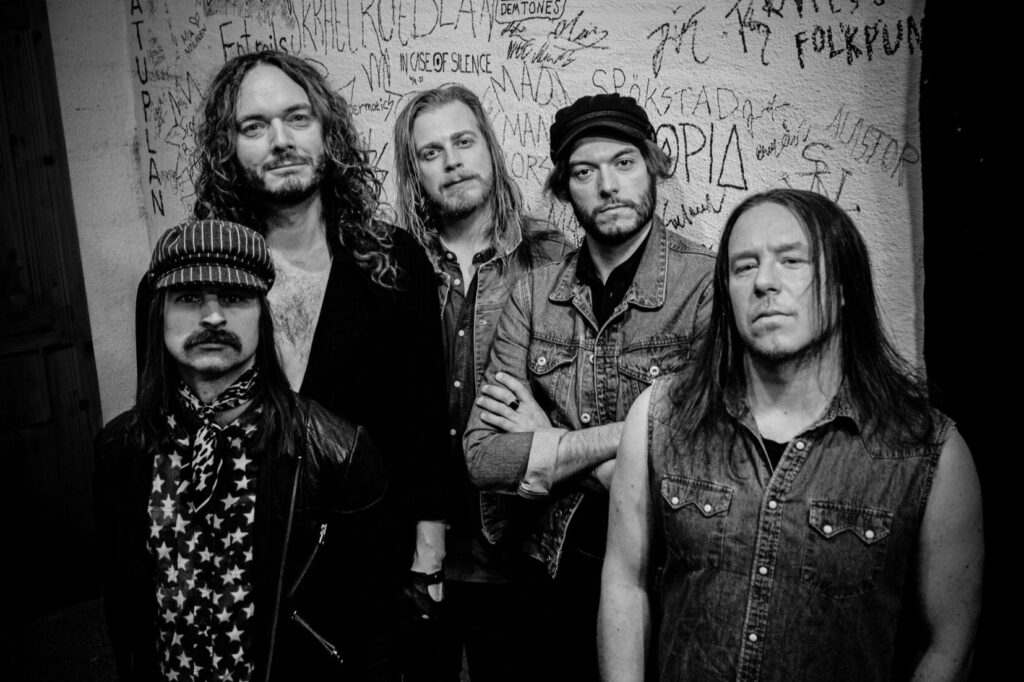
Det var ju ungefär ett år sedan er senaste platta kom ut. När ni lyssnar på den idag, om ni har gjort det den senaste tiden, vad känner ni för den då?
Tomas: Men jag älskar att lyssna på egengjord musik. Jag skäms inte en sekund. Det är ju den musiken jag brinner för liksom. Det är inte mitt jobb. Jag har ett jobb. Det behöver jag inte älska. Hade jag jobbat med det, ja, då hade man ju också älskat det givetvis. (Suckar) Fortsätt Adam. Alltså, jag vet inte var jag är på väg.
Adam: Alltså, för min del, för jag började i bandet för ungefär ett år sedan, nästan exakt…
Tomas: Men har ändå jobbat med oss.
Adam: Ja, jag har varit med och varit chaffis och merchat och så. Men både platta ett och två har jag inte varit med på. Jag började ju precis när platta två var klar. Hade jag börjat en månad innan så hade jag kanske spelat, men då ska jag också lära mig låtar, men då finns det ju duktiga musiker i bandet som kan lägga bas istället. Så jag har ju inte varit med i någon process där. Så jag har mer hört det som lyssnare ju och båda plattorna är ju jävligt bra. Men på olika sätt liksom. Jag tycker första har en lite mer ölhävarrockvibe över sig, medan andra har lite mer finess över sig. Och sedan när man har börjat spela låtarna så har man märkt att det är rätt smart skrivna låtar, tycker jag. När man började i Ström då och skulle ta ut 20 låtar på en månad och lära sig liksom så var det ”Fan, det är lite krokar här och där. Coolt. Den där har jag aldrig tänkt på.”. Men när man spelar ”Fan, det är ju rätt häftigt det där.”. Små teoretiska ointressant-för-lyssnarna-grejer, men för mig är det inte det. Så olika skäl har de ju, men likvärdiga skivor i att det är bra rock liksom.
Vad hände med Joel Carnstam egentligen? Fick han lämna? Eller valde han själv att lämna?
Tomas: Han fick lämna. Alltså, det var engagemanget och det musikaliska. Han är ju helt underbar som person, verkligen. Jag har stött på honom många gånger och han har väl lajkat grejer och sådär.
Adam: Vi spelade ju på Linnéparken i Växjö, som är deras öppna gratis sommarscen, och där är det ju stora artister, Tommy Nilsson och vad det nu är, som är gratis. Så det kan väl vara 3,000 pers där. Där spelade vi och då vet jag att Joel var där till exempel. Skitkul. Vi bara hann precis morsa. Jag skulle till merchen och så.
Tomas: Jamen, det är inga hard feelings nu. Alltså, det har ju gått så pass lång tid liksom och vi jobbar ändå inom samma bransch. Jag stöter ju på honom ibland. Men nej, så det var inget liksom så.
Det har ni såklart hört förr, men era influenser, det första man tänker på är ju AC/DC. Det gör ju de flesta som lyssnar på Ström för första gången. När ni skrev låtarna i början, var ni 100 procent medvetna om att ”Fan, här kommer folk säga att det är AC/DC fast en annan typ av AC/DC.”?
Tomas: Alltså, du kan ju bara tänka dig in i namnet, för det första. Alltså, alla idéer vi la på bordet… De låtarna som jag har skrivit var ju till och med sparade i en AC/DC-mapp på datorn. Liksom ”AC/DC-ish”, kommer jag ihåg att min mapp hette. Och sedan så hade vi arbetsnamnet Ström då, i och med att AC/DC är växelström/ likström. Och ju mer gig det gick, så fick det ju bli Ström liksom. Sedan finns det massvis med artister som heter Ström, men jag tror inte det finns något band nu. Men det bara omfamnar ju vi, herregud, alltså att det är AC/DC. Men jag tycker ändå vi har tagit det många, många steg vidare. Det här med stämmorna. Vi lägger jättemycket tid på sådant. Liksom, jag var inte komfortabel med det. Jag tänker ju mer på att sjunga rätt än att spela trummor rätt. Det var ju en uppförsbacke. Och det var ju en uppförsbacke för Adam med när han hoppade in.
Adam: Jag är ju basist, inte sångare. Alltså så. Det är ju inget att snacka om, herregud. Men jag tror att man är nog fullt medveten om att folk tänker att det här är AC/DC på svenska. Det är inget konstigt. Men återigen, det här när man själv spelar så kan ju en annan ”Alltså, de här stämmorna hade AC/DC aldrig haft. De hade aldrig haft detta riktigt. De hade aldrig haft en så här mollig låt.”. Men jag fattar också att om min mamma hör detta eller någon människa som gillar musik säger ”Det här låter lite som AC/DC.”. Så det är ju inget att skämmas för. Alla vi älskar ju AC/DC. Men musikaliskt vet vi att det finns, men det skiter ju alla i. Men jag tycker det finns rätt mycket Kiss-influenser också. AC/DC för mig är ju en genre. Det är ju inget annat band som är AC/DC. Det är ju bara dem. Det är en genre för mig. Men att det finns mycket både 70- och lite 80-talsgött där.

Om Ström någon gång skulle göra en tvättäkta ballad, hur skulle den låta? En riktig så här power-ballad.
Tomas: Där har du en av de här strukturerade frågorna vi diskuterar ibland. Vi är ju i den diskussionen ibland. Alltså, vad fan, vi gör ju den musik vi vill. Åh, det låter så jävla klyschigt. (Suckar)
Adam: Alltså, ska man göra en ballad så ska man ju göra en ballad. Då ska det inte bara vara en akustisk låt. Men det är jättesvårt att säga. Men visst alltså, vad fan, en ballad med verkligen stråkar. Alltså, så här Beth-aktig. Och vi spelar inte detta live. Det är bara Zdravko som sjunger och vi går av typ. Är det bra, så varför inte? Men det är svårt. Jag tror inte det kommer vara en akustisk låt i alla fall. Det kommer ju vara elgitarr och trummor och det kommer vara hårt, om det nu sker.
Det här har ni väl fått höra förut också. Kan ni fundera på att göra engelskspråkiga låtar till en vana vartefter, om man säger så? Det har ni säkert också diskuterat, på något sätt i alla fall.
Tomas: Ja, fast den diskussionen ligger nere nu. Vi är så jävla stolta över att vi sjunger på svenska och vi har fått så mycket lovord för det, och vi har hittat små, små, små öppningar utanför Sverige som vi kanske kommer nappa på och då blir det ännu starkare att vi liksom ”Jamen, nu måste vi köra det här på svenska.”. Nej, så det ligger inte i närmaste framtiden. Det gör det inte. Dock så har vi varit inne på, i och med att Zdravko är kroat, att kanske översatta någon låt till kroatiska bara för att han vill ge något hem liksom.
Adam: Jag menar, att göra en låt på engelska som en engångsgrej, eller som ett statement, eller som ett samarbete, eller som en duett, eller då översätta någonting, okej. Det kan ändra sig i morgon, men jag tror inte man känner för att göra en hel platta faktiskt. Va fan, Zdravko sjunger ju på småländska, och är kroat. Alltså, det är ju fantastiskt liksom. Och det är mycket som försvinner. Engelska pratar ju alla, eller så. Så nej, jag är inte så sugen på det faktiskt. Jag vill att det ska vara småländska.
Det är ju ganska få band som är ifrån icke engelsktalande länder som lyckas slå på sitt modersmål i andra länder. Men det kanske inte är ert mål heller, att bli nästa…
Tomas: Rammstein.
Adam: Jamen, det är ju Rammstein-jämförelsen som kommer rätt ofta. Alltså, ett band som sjunger på tyska och som är skitstora i bland annat Sverige. Och jag kan fatta att liksom jänkare kanske inte… Visst, de kan gilla musiken. Men att Ström skulle funka i Tyskland, Spanien, Finland och hela Skandinavien, det är inget konstigt för mig. Ja, vad fan, att den kroatiske sångaren åker och turnerar där. Alltså, sjunger på svenska och med mellansnack på kroatiska. Jag tror engelsktalande länder är minst chans, men alla andra då, tyska, spanska, franska, de som redan har engelska och sitt språk, är nog mer öppna för det. Så egentligen tror jag inte det är någon så konstig grej. Men det är en jätteuppförsbacke, självklart. Rammstein är ju ingen självklarhet, för det är alltid lättare när man vet vad fan man sjunger när man hör något, ”Står jag för detta? Gillar jag detta?”. Men som Rammstein, jag skiter ju i vad deras låtar handlar om. (Skrattar)
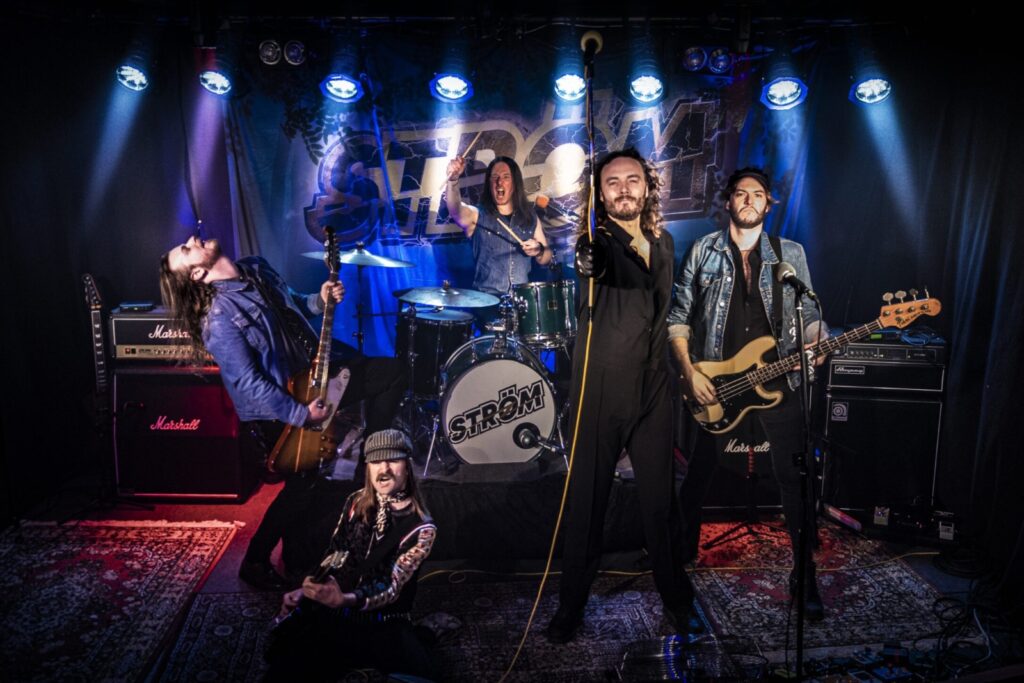
Än så länge, när bandet håller den här nivån, känns det ganska enkelt gentemot familjer och allting med att komma iväg och spela gig. Ni är välstrukturerade, sa ni…
Tomas: Vi hade precis den här diskussionen nu när vi väntade på vår Uber.
…men då tänker jag så här: Om det tar lite mer fart, om det skulle vara enkelt idag, hur svårt blir det då att kombinera med bland annat familjer?
Adam: Jag tänker att det där är något man får lösa. Alltså, det är ett skittråkigt svar kanske. Men jag tänker att vill man något mycket, vilket vi vill just nu, och att backa på det för att ”Jamen, tänk om det blir jobbigt om ett år.” hade varit rätt hjärndött liksom. Det är ju väldigt sällan band idag, som på kanske 90-talet, blir stora och världsstjärnor på en natt. De följer ju varandra. Alltså, Tomas har barn, till exempel, och om fem år, då är de också fem år äldre. Så jag tror man får lösa grejer då, att det kommer växa ihop där.
Tomas: Och jag kan nästan tycka att den här nivån vi är på nu, det är ju den allra jobbigaste, för nu är det liksom bara ”Men fan, Lina (Nuvarande sambon). Nu trillade det in två gig till här.”. Det är inte ”Lina. Nu trillade det in 12 gig till här.”. Utan den här nivån är ju allra jobbigast, för det här måste pusslas, som liksom ”Vi måste ha barnen.”. Och jag som också lever varannan-vecka-livet med barnen och så där. Så jag tror att skulle det upp en nivå till, då skulle det nästan bli lättare, för då vet alla runt omkring, liksom i och med det här med varannan-vecka-livet och då finns det ju en barnens mamma och sådana där grejer. Då fattar de också att ”Men fan, det här är ju faktiskt något. Det här är inte 7 till 16. Han är ute och spelar.”. Alltså, på den nivån som är lite under detta, då var det ju mer lägre gage, man blir full, liksom. Och det är rätt skönt att komma upp från det, för nu har vi mycket, mycket mer ansvar. Vi har ett av världens största bokningsbolag, vi har ett väldigt renommerat skivbolag, vi har manager, vi har bussbolag, vi har vårt crew. Det är fan allt möjligt. Det är en jävla produktion liksom. Det är väldigt mycket ansvar. Så jag tar inte något mer glas… Jo, jag kanske tar ett halvt glas vin till innan gig idag, för att det är ett ansvar liksom. Om man har kommit upp på den här nivån så fattar folk liksom att man inte är iväg bara för att ha kul, utan det tär fan på familjelivet och så där liksom.
Adam: Och sedan, skulle man hoppa upp det där pinnhålet, det är ju svårt vad det handlar om, men ett pinnhål upp brukar ju kanske betyda, inte fan vet jag, men dubbla gager mot det vi har nu. Eller vet man att det alltid är så här mycket varje gig, att det aldrig kommer vara mindre, då kan man ju också börja avlöna crew-medlemmar lite mer på riktigt och inte det här kompispriset. Gör man det så är det ju ett större ansvar på dem. Då har vi mindre att bära. Alltså, då är det också en maskin som klättrar, eller flera delar som drar upp varandra.
Tomas: Och du kommer hem med, som Zdravko brukar säga, både skinka och ost på mackan. Man bidrar hem också liksom.
Adam: Och man kan dra ner på jobbet kanske, beroende på var man jobbar och hur man har det. Gå från 100 till 70 och då kanske man har tid att repa mer och då blir vi också bättre. Men det är väl bara att hitta det där gyllene ögonblicket, ”När har alla så gott om pengar? Allt är lugnt hemma. Inga renoveringar på gång. Så vi kan göra detta nu.”. Men jag tror det kommer att lösa sig, för vi vill ju detta liksom, och då löser det sig alltid.
Tomas: Och allas våra barn, nu har ju inte alla barn, men de är ju i den åldern där de fattar, liksom ”Jamen, pappa är iväg och lirar.”. Jag tänkte att jag skulle filma med Cazzi Opeia. (Intervjun görs i hennes hem.) Liksom, ”Nu är jag hemma hos Cazzi Opeia.”. Elsa kommer ju dö. (Skrattar) Men jag tror att en nivå till skulle liksom bli lättare. Det här är den jobbiga nivån, där man bara trampar och kämpar.
Adam: Men det är också en underbar nivå. Vi har varit på turné nu nästan hela våren. Fem helger liksom. Sedan är turnén slut, men då är det egna gig som börjar. Så det börjar bli rätt uppbokat i år. Allt är inte släppt ännu officiellt, men vi vet ju vad som komma skall och det ser väldigt bra ut. Liksom, det är schyssta ställen, schyssta band att lira med, bra gager. Så det är jättekul detta år, och blandat med festivaler, klubbar, stadsfest och annat. Jag ser mycket fram emot detta år. Det känns som det är ett jävligt bra uppstyrt år.
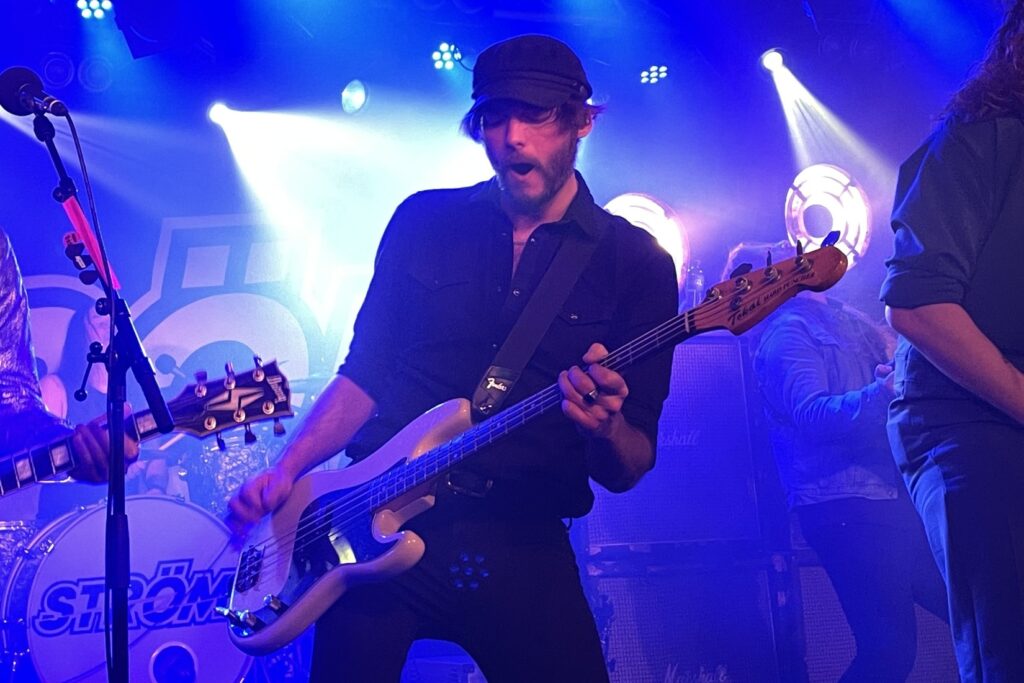
Nu har ni ett par skivor i bagaget. Kommer drömmen någonsin försvinna, tror ni, om att bli större och att kanske kunna försörja sig på det här? Försvinner den drömmen någonsin?
Tomas: Oj, det var ju fan ingen liten fråga. Herregud. Kan den unga få tala först? Jag har mitt svar färdigt. (Skrattar)
Adam: Jag kan ju bara tala för mig då. Men att vilja spela musik kommer aldrig försvinna. Sedan är det beroende på var man är i livet. Jag har ingen aning om vad som händer om 20 år. Fan, vi kan dö i en bilolycka. Alltså, man vet ingenting. Men om 20 år så kommer jag fortfarande ha kvar mina instrument, sedan om jag spelar rock, eller om jag spelar något annat, eller spelar covers på en pubafton för att jag gillar att spela… Men jag kommer alltid vilja spela. Sedan får väl framtiden avgöra drömmen, men just nu känns det som att drömmen om att vilja leva på det här och att det ska bli stort alltid kommer finnas. Men det får vi ju också se om 23 år, hur pepp är man då? Tre hjärtinfarkter senare. Nämen, du fattar. Så musiken kommer fan alltid vara kvar. Det svär jag på liksom.
Tomas: Jag kan säga så här: Det är ju så tacksamt att vi spelar rock, för det kommer alltid att finnas, för den är så genuin. Det kommer alltid finnas en marknad för trummor, bas, gitarr, om vi stryker sångaren. Det kommer alltid finnas. Vi kan fortsätta göra plattor, vi kommer alltid finnas i etern, vi kommer alltid skita i vad folk säger. Jag har personligen släppt för ganska länge sedan att man ska leva på det eller så. För alla vi har ju haft rockstjärnedrömmen. Herregud, alla posters man hade liksom. ”Det där är jag om 20 år”, tänker man när man ligger där när man är 13. Och det har hjälpt mig, att jag har släppt den drömmen och bara lugnat ner, liksom ”Gör det som är kul. Fan, du har barn, du har jobb, du har hus, du har det bra. Ja, iväg och spela lite trummor.”. Och det blir ju också den miljön av det. Vi är väldigt familjära i det här bandet, och det är skittråkigt att läsa om, eller höra om, men det är ju fan 2025. Det går inte att ha Sunset Strip i Växjö liksom.
Adam: Jag kommer alltid spela och just när man kanske slappnar av lite, det är då något händer med det. Likaväl att om du är singel och går ut och raggar, då kommer inget hända. Den dagen du går ut och säger ”Jag tänker inte ragga medan jag sitter och dricker öl.”, då kommer folk plötsligt fram. Sedan behöver man ju fortfarande vara affärsmässig och göra vettiga val, för att det är en maskin liksom. De har ju sagt till mig att innan Ström började så var ju målet att spela i Alvesta, som ligger 14 minuter från Växjö, ”Det är fan ett bra mål. Då är vi ute. Då är vi i en annan kommun.”. Det tog ju liksom något år och sedan var ju det klart, och sedan så helt plötsligt hände det grejer för att alla då hade en känsla av att ”Vi dricker några bärs, vi repar lite hårdrock och ser vad som händer.”. Men om de hade träffats och sagt ”Nu måste vi göra något som ska slå. Vad ska vi jaga?”, då knyter det sig lite grann. Jävla psykologilektion här.
Tomas: Men psykologi. Alltså, vi har ju en viss kemi i bandet. Vi kan läsa av varandra direkt liksom. Och det gäller väl alla band kanske, men vi är också öppna för att ta den diskussionen.
Adam: Vi har en jävligt god stämning och vi har kul ihop. Och ibland är det jobbigt, och det får vara jobbigt. Liksom, folk har andra liv, eller någon har haft en skitvecka på jobbet, eller någon håller på och säljer ett hus. Alltså, du vet, livet pågår ju samtidigt för att vi inte är purunga. Vi är inte 19, tagit studenten och skiter i allt, utan folk har liksom ett liv och då får man ju stötta varandra. Ibland kan jag komma till repen och ”Fan, vad sliten jag är.” och så hör jag något de andra säger, ”Okej. Jag är inte så sliten längre, för ni hade det värre idag.”. Alltså så. Jag är trött för jag bara fick mina sju timmar i natt och Tomas kanske har sjuka barn hemma och har inte sovit på hela natten, så ”Okej. Ja fan, nu är jag sugen på att åka, för nu fick jag lite energi där.”. Men att det är okej liksom att det inte behöver vara så jävla over the top, utan vi gör det här ihop och det är kul.
Av Tobbe – Publicerad 19:e april 2025

Göteborgska power metallarna Dragonland gästade Stockholm för första gången någonsin och Metal Covenant passade på att prata en stund med sångaren Jonas Heidgert och keyboardisten Elias Holmlid.
Det tog i runda slängar 25 år för Dragonland att äntligen komma till Stockholm. Ni har ju varit i Australien och ni har varit i Japan till exempel. Vet ni varför det aldrig blev av tidigare egentligen?
Jonas: Det måste ju bara vara en olycklig slump egentligen. Och sedan är det väl kanske en ganska nischad genre. Det kanske inte funnits några ställen som kanske har varit intresserade.
Elias: Så kan det vara. Sedan har vi ju inte som tradition att spela supermycket live heller egentligen genom åren, så det har väl säkert med det att göra också såklart.
Jonas: Jag brukar alltid säga det på intervjuer, att vi är ju ett gäng jävligt lata snubbar i det här bandet egentligen. Vi är bekväma av oss liksom. Om ingen hör av sig och frågar, så.
Elias: Nej, precis. Och det är ingen som har ringt oss från Stockholm förrän nu, så att. (Skrattar)
Angående orden då, tradition av att inte spela, Det ligger faktiskt bara, vad jag kan se, tre stycken gig listade på Facebook. Här i Stockholm, ett i Norge och på Masters Of Rock i Tjeckien. Så är det då det enda vi kommer få se av Dragonland live 2025?
Jonas: Ingenting är väl ristat i sten på det sättet, men det hänger lite på om någon hör av sig, och om det är görbart för oss liksom, för det är ju logistiskt sett inte jättelätt med vårt gäng att få ihop det alla gånger heller. Alla måste ju kunna och alla måste få ledigt. Det är mycket som ska klaffa liksom. Men visst, dyker det upp något riktigt coolt så kollar vi. Vi ser ju alltid över möjligheterna. För min del så vill jag ju absolut spela mer med det här gänget.
Det är ju så att inte alla band spelar fortfarande så traditionell power metal som Dragonland gör. Hur kommer det sig att ni egentligen aldrig ramlade in i det här rockträsket som till exempel Avantasia och Sonata Arctica gjorde? Hur kommer det sig att ni stannade vid power metal? Senaste skivan är ju en rejäl power metal-skiva.
Elias: Det är en jättebra fråga. Jag vet faktiskt inte. Vi har försökt att förnya oss och hitta på nya vinklar och sådant.
Jonas: Vi började ju laborera efter Holy War egentligen. Där blev det ju lite annorlunda. Vi testade väl lite nya infallsvinklar och testade olika grejer, så att säga. Men det är väl egentligen att vi kanske mer föll tillbaka. Det kändes tryggt. Det var väl kanske läge att släppa en sådan dängplatta igen liksom. Eftersom det dessutom var så pass stort glapp mellan den och föregående.
Elias: Det är nog lite så också just att vi inte har spelat och det har ju varit lång tid emellan och så, men om man är ett band som turnerar och måste göra en skiva på typ en månad och sedan ut på turné igen, då hinner man kanske inte reflektera så mycket som vi har lyxen att göra då.
Jonas: Sedan är det väl lite så också att vi har liksom aldrig haft någon som riktigt sätter press på oss heller, utan vi har ju styrt över det själva, helt enkelt, liksom när lusten faller på lite grann.
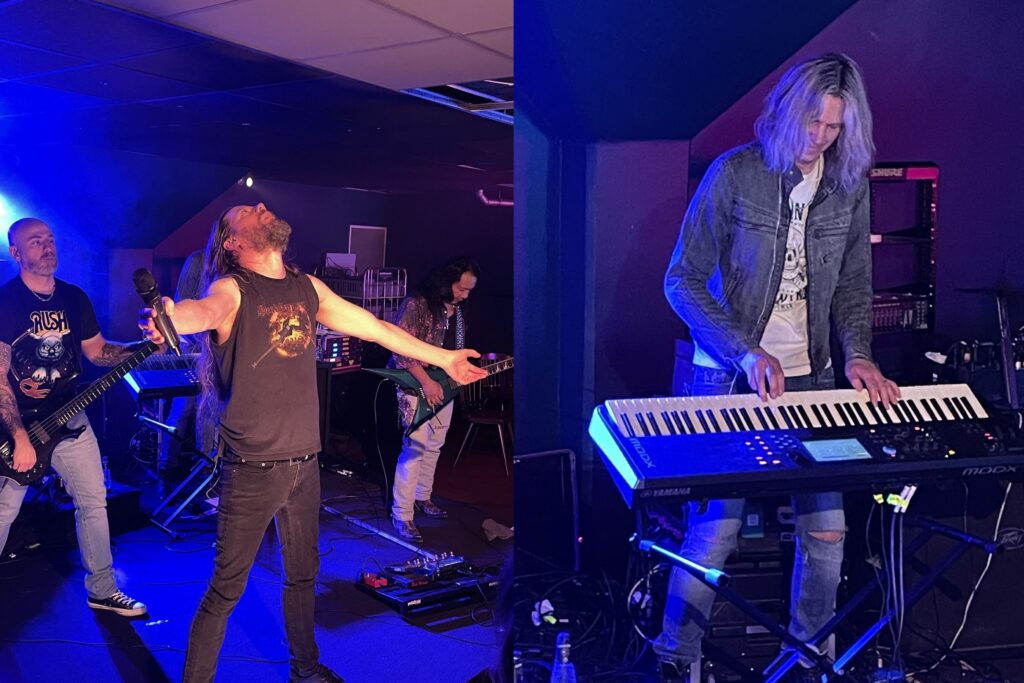
Jag var inne och spanade lite på er Facebook-sida och ni har väl en 60,000 följare drygt. Det är inte så pjåkigt, med tanke på att ni inte har någon som sätter press på er och att ni har varit borta ganska länge.
Jonas: De som är våra fans liksom är extremt trogna och så otroligt tålmodiga egentligen. De har ju stannat med oss hela vägen, liksom även om det har varit långt mellan plattorna, och framför allt de senaste plattorna. Men då har ju impacten blivit ännu större när det väl dyker upp någonting från oss, eftersom varje gång man postar något inlägg eller någonting, då blir ju folk heta på gröten igen.
Lyssnar ni själva någonting på power metal och har ni koll på power metal-scenen idag överhuvudtaget?
Jonas: Extremt lite. Jag lyssnar väl inte så mycket på musik överlag. Visst, när man är på jobbet och sådana grejer, men då lyssnar jag på ofta lite hårdare grejer. Eller krångligare grejer, som Dream Theater eller Cradle Of Filth.
Elias: För mig var det nog de två första Rhapsody-skivorna och sedan så tappade jag lite hela grejen. Men visst, man kollar väl kanske någonting någon gång, men det är väldigt sällan faktiskt.
Jonas: Men det är inte som så att jag slänger på en Stratovarius-platta längre, som var någonting jag lyssnade enormt mycket på. När vi började egentligen, då var det ju det man lyssnade på och det som influerade en hel del, liksom den typen av musik då. Men jag upplever väl att genren har blivit jäkligt utspridd. Det finns väldigt mycket power metal ute nu, känner jag i alla fall. I alla fall via sociala medier liksom.
Elias: Det finns väl mer den här väldigt välproducerade, typ Powerwolf. Förr var det ju mer att, det var välproducerade grejer, men det var inte riktigt den typen av produktioner som var så här väldigt slimmade liksom, och nästan så här studioprojekt, låter det som liksom. Väldigt välgjort.
Om ni själva skulle försöka beskriva. Vad är en typisk Dragonland-låt och vad innehåller den?
Elias: Det är väl ofta så här dramatiskt och symfoniskt i botten. Det är ju mycket det vi har gått på liksom sedan länge. Och oftast är det story-drivet.
Jonas: Just de story-baserade, eller de temaplattorna som vi har, det är väl egentligen den genetiska grunden till vad vi gör. Sedan om man ska ta liksom låtexempel så skulle jag vilja säga, ja, The Black Mare är väl stereotypen av vår typ av power metal egentligen. Just den symfoniska biten tar ju väldigt stor plats.
Er senaste skiva släpptes i oktober 2022. Men ni spelade in den för ungefär tre år sedan. Hur ser ni på den skivan idag, om man säger så? För den är ju inte så där superny längre, även fast den är den senaste.
Elias: Det var ju ett tag sedan man lyssnade på den, alltså på det sättet. Men jag är väldigt nöjd med hur det blev. Det var ju väldigt lång tid mellan plattorna och det kändes ju också som att när det har gått så lång tid så vill man kanske göra någonting som är lite längre också. Skivan är ju ganska lång. Jag är väldigt nöjd med att jobba med Jacob Hansen igen och med produktionen är jag väldigt nöjd med hur det blev i slutändan.
Jonas: Ja, där visste vi ju vad vi skulle få liksom. Vi visste att han visste vad vi ville ha.
Elias: Dels var vi väldigt nöjda med hur Under The Grey Banner blev och när det gått så här typ 10 år, då är det ju klart att då känner man lite att vi måste ändå på något sätt ligga i en fas med det.
Jonas: Jag är nöjd med vad vi valde för story-inriktning. Liksom själva sci-fi-temat fungerar mycket bättre till de här låtarna än vad det hade gjort med hästar, orcher, troll och mithril-svärd. Det känns väl ändå som att vi gjorde det rätt och jag är ju skitnöjd med den plattan också.
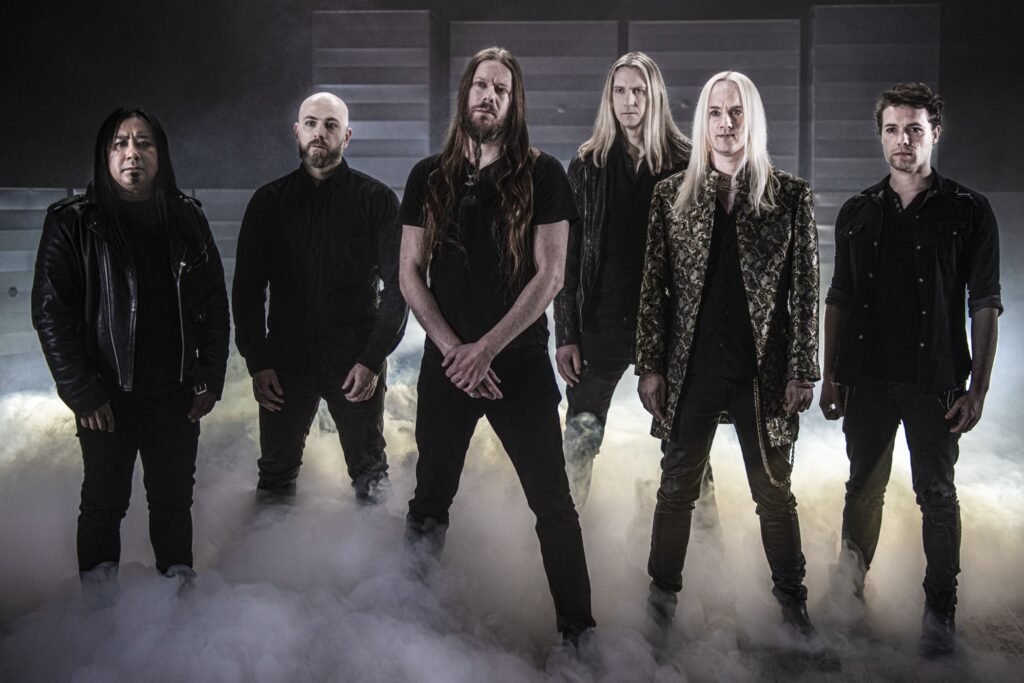
Och som ni har hört hundra gånger förut så var det ungefär elva år mellan plattorna. Kommer det att dröja till 2033 innan vi får se nästa platta?
Elias: Det hoppas vi inte, för vi har skrivit klart hela nya skivan. Det är bara att vi inte har spelat in än. Så skulle det gå elva år hade det varit tragiskt i det här läget.
Textmässigt, hur ser det ut nu inför nästa platta?
Jonas: Oh, det vet jag inte om vi kan avslöja någonting om. Det känns lite för spoiligt med tanke på att det inte ens är inspelat än.
Om vi säger så här: Kommer det att vara ett klart tema eller kommer det att vara lite mer spritt då, utan att gå in exakt på vad?
Jonas: Nä, det är ju det jag inte vill. Jag vill nog inte närma mig det ämnet. Närmare inpå release så kan man göra det. Efter typ en första singel är släppt så kan man nog komma med det. Och ingenting är skrivet i sten heller, så att saker kan ju ändras liksom.
Musikaliskt, kan man tänka sig att det kommer att följa ganska mycket på The Power Of The Nightstar?
Elias: Ah, det är inte så säkert.
Aha, intressant.
Elias: Det är ju fortfarande power metal liksom. Det är inte rock.
Jonas: Och det hörs ju tydligt att det är vi liksom. Det genomsyras av vår typ av sound, eller vad man nu ska kalla det. Så de som har hört oss innan kommer att höra att det är vi fortfarande.
Du nämnde ju Stratovarius, Jonas, och du, Elias, nämnde Rhapsody. Vad fanns det för andra band som ni egentligen tog influenser av?
Jonas: Rhapsody, Sonata Arctica, Stratovarius var det väl. Det var väl de tre framför allt som fick in mig i genren överhuvudtaget. Innan dess så var det ju Maiden, Helloween, lite mer åt det hållet. Men någonstans där så hände det någonting just av det här snabba och supermelodiska. Jag är ju väldigt torsk på synt och keyboard, och det finns ju i sådan musik liksom.
Elias: För mig var det egentligen bara Bal-Sagoth och Cradle Of Filth. Jag gillade inte så mycket power metal egentligen när jag började i bandet. Men vi var en samling goa gubbar, så jag tänkte att ”Det kan man ju ge en chans.”.
Jonas: Och det var ju mer på skoj också, liksom på den tiden i början. Det var ju mer eller mindre planerat för två plattor. Sedan var det förjävla roligt bara, så då, ja, ”Vi hittar på någonting annat då.”, och så fortsatte det.
Vad är det som inspirerar er nu då att göra ytterligare en platta och att skriva musik under de senaste fem åren?
Elias: Det är väl mer att man ser fram emot den här goa känslan när man har gjort klart någonting. Ibland kan det ju vara en väldigt traumatisk och plågsam process att skriva, och framför allt förra gången, när det gått 10 år innan man skulle börja skriva på allvar liksom.
Jonas: Men samtidigt så är det ju jävligt tillfredsställande varje gång när en ny låt börjar ta form.
Elias: Ja, när man väl får till det. Man kan sitta en dag och så känns allt bara värdelöst, och sedan plötsligt får man en idé. Vi skulle kunna skriva en skiva säkert på några månader liksom, men det ska ju kännas som att det är någonting som man hittar en ny infallsvinkel på, och då känns det ju gött liksom.
Jonas: Det måste ju finnas känsla och tanke bakom det man gör också. Vi vill i alla fall inte bara skriva en platta för att släppa en platta. Det funkade ju svinbra på 80-talet med alla de här banden, för det var ett klart och tydligt sound liksom. Men som sagt, vi tycker nog det är värt att det tar längre tid i sådana fall, och att vi själva kan stå för det vi släpper.
Det säger många artister såklart, att det är ju en väldig tillfredsställelse när man står där med en färdig skiva efter ett så långt jobb.
Elias: Ja, det är ju gött när man äntligen har den i handen. Dels att skriva låtarna kan ju, som jag sa, vara lite plågsamt ibland, alltså rent kreativt, och sedan är mixningsprocessen och sådant ju väldigt mycket jobb liksom. Mycket småpill och det drar ut på tiden och så där. Och det är gött när man sedan väl är färdig och säger ”Nu kan vi inte ändra någonting mer. Vi kan inte gå in och pilla här något mer, utan nu är det färdigt.”. Det är en befriande känsla på något sätt också.
Jonas: Ja, extremt tillfredsställande.
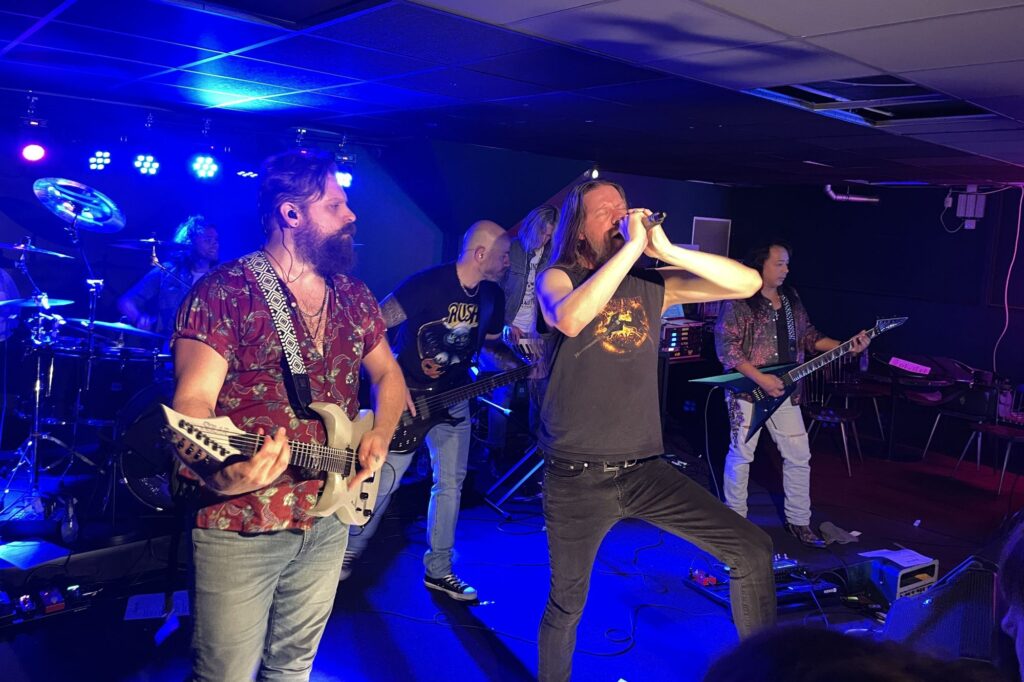
Med det här långa uppehållet och nu ytterligare ett par år in i er karriär efter skivan 2022, hur upplever ni än idag den här skillnaden som har skett i hela musikbranschen? Det har ju svängt från att folk köpte skivor, och sedan kom nedladdning typ i början av er karriär, men sedan tog det en helt annan fart ungefär när ni lade ner och att ingen köper skivor nästan.
Elias: Jag vet inte. Jag har nog inte mycket känsla för det egentligen.
Jonas: Däremot har man ju fått inse och acceptera streaming någonstans. Det är ju det som gäller för de flesta. Men sedan upplever man väl att det har blivit ett litet uppsving på ren fysisk försäljning igen. Det är folk som samlar.
Elias: Ja, CD-skivor är på väg tillbaka har man ju hört lite grann.
Jonas: Ja, precis. Vinyl har ju kommit tillbaka de sista åren också, och nu börjar ju CD komma igen, så folk kanske har tröttnat på den här stream-grejen. Man vill ha grejen stående i en bokhylla hemma.
Elias: Alltså, det enda jag tycker är jobbigt med streaming-grejen lite grann är att när vi släpper en temaplatta liksom, då måste man släppa singlar. Det känns lite fel. Man vill att folk ska få hela grejen på en gång och lyssna från början till slut, men så kan man inte jobba längre, utan singlarna måste ut.
Jonas: Jag var jävligt anti det inför Power Of The Nightstar, liksom med just singlarna. Jag var inte alls förtjust i det. Men efter vi väl gjorde det, då fattade jag liksom ”Okej. Det är därför.”, att det made perfect sense liksom.
Önskar ni någon gång idag att ni ändå hade satsat hårdare på bandet för en 15–20 år sedan, när det begav sig, om jag törs säga det utslitna uttrycket?
Jonas: Det är svårt att säga om vi hade kunnat göra någonting annorlunda egentligen. Vi valde väl kanske inte att inte göra grejerna heller. Men samtidigt, som jag sa tidigare, så är vi ganska lata, så önska och önska. Visst, jag hade väl gärna sett att vi hade varit ute och lirat mer genom åren som har gått, men det är lite svårt att göra någonting åt det nu. Men man får ju se vad framtiden har att bjuda på istället, och se om det blir mer grejer.
Elias: Sedan vet man ju inte, att om vi hade satsat stenhårt, då kanske vi inte hade funnits kvar som band heller. 26 år är en väldigt lång karriär för ett band. Det kan vara svårt att försörja sig på power metal fullt ut och då kanske det ändå inte hade funkat i längden. Så jag är väldigt glad att vi fortfarande finns kvar.
Jonas: Sedan tror jag väl att just den slappa approachen, om man kan uttrycka sig så, som vi har haft, det har ju kanske även gjort att vi har inga eller väldigt få interna konflikter eller någonting. Vi har liksom aldrig haft någon typ av strul på det sättet, utan alla har ju dragit åt samma håll liksom. Visst, någon kan ha kommit med något önskemål som inte går igenom, men då köper man det liksom. Jag tror att om vi hade liksom pushat hårdare så kunde det ha hänt att folk hade tröttnat. Så jag tror nog att vi har gjort rätt, för vår del i alla fall.
Du nämnde orden försörja sig, Elias. Det är ganska få band som ändå kan verkligen försörja sig på sin musikkarriär. När man börjar att starta upp ett band så är det mest för att man tycker att det är kul att lira. Sedan vänder det kanske lite, att ”Man kanske kan göra en karriär av det här.”, men sedan kommer de allra flesta till den här hemska tidpunkten, ”Det här kommer ju aldrig att funka ekonomiskt. Det här kommer ju aldrig att bära sig.”. Har ni någonsin pratat om det här?
Elias: Jag hade nog den känslan när vi skrev Starfall. Då var jag så här ”Det här kommer bli den bästa skivan någonsin. Nu kommer breaket efter det här.”. Vi jobbade ju som idioter med den skivan, jag och Olof då på den tiden. Jag hankade mig fram på Postverket liksom och kände efter de två åren att ”Nä, det här är grymt, men jag tror att här får jag nog hitta någonting annat att göra parallellt.”. (Skrattar)
Jonas: Jag hade aldrig några illusioner på att det skulle vara något man skulle kunna leva på, i och med att genren är så pass nischad som den är. Den är ju jävligt smal egentligen. Ska du kunna leva på det så behöver du spela musik som tilltalar en mycket bredare publik än vad vi gör, om man ska vara krass egentligen. Så att, nä, jag har aldrig känt att ”Okej. Det här kommer jag att leva på nu.”. Även om vi har vetat att man haft en kanonplatta på G så har man ändå känt ”Ja, det blir kul det här. Det kommer att bli bra och det kanske blir några extra kronor i fickan.”. Men jag blir nog kvar på mitt lager ändå liksom.
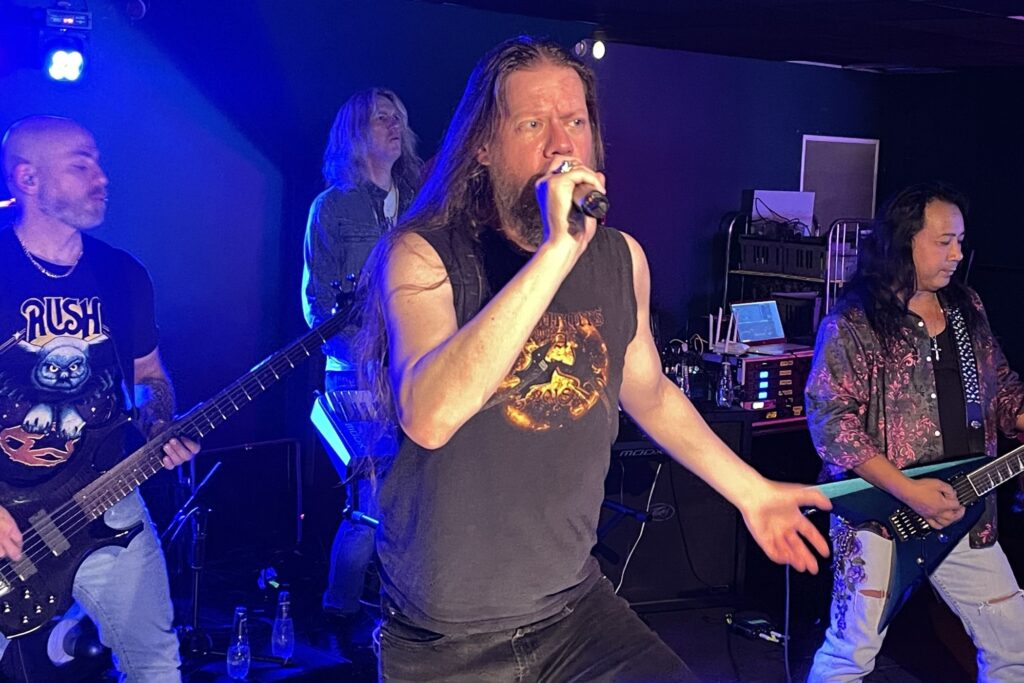
Era familjer, barn, släkt och vänner. Vad tycker de om att ni fortfarande lirar i ett hårdrocksband? Positivt och negativt. Vad säger vänner, släkt och alla till er?
Elias: De tycker att det är kul.
Jonas: Jag har bara positiv push bakifrån, liksom från familj, kompisar och släkt. Det är möjligtvis ungarna som kan tycka att det är lite töntigt liksom. Jag vet att de tycker att det är lite coolt att pappa håller på med sådana grejer och åker runt ibland och spelar. Men samtidigt så gillar de inte musiken, så då tycker de att det är töntigt, på det sättet då.
Elias: Jag får ju mestadels höra de negativa grejerna. (Skrattar)
Jonas: Sedan för min egen del så lirar jag ju med ett annat band och vi spelar väldigt, väldigt mycket, men det gör ju just att de här små breaken man spelar med mitt ”riktiga band” blir så jävla mycket roligare när det väl blir någonting. Som du sa, att vi bara har tre spelningar det här året, men då ser man ju fram emot dem desto mer liksom. Då blir det ju en liten höjdpunkt för året, att köra de här få istället. Jag vet ju inte hur man hade känt och tänkt om vi hade spelat 30 gig det här året. Då kanske man hade varit lite trött och sleten och, kanske inte tappat gnistan, men det hade nog inte känts lika kul.
Men det är en sak som man alltid måste göra innan man spelar några gig. Man måste repa. Hur känns det att repa när man spelar så sällan?
Elias: Själva repningarna, då har man ju lärt sig allting och då sitter det ju för det mesta. Men just när man börjar och ska lära sig låtarna själv igen, det tar ju ett tag. Man är ju dålig på att hålla igång allting om det gått ett år emellan liksom, så då blir det till att öva upp igen och memorera allting och så där. Men det är ju roligt såklart, och det är alltid gött när man väl har träffats och kör några rep liksom.
Jonas: Jag har ju det enklaste jobbet där egentligen. När vi har bestämt en setlista, då lägger jag in den på Spotify igen och går omkring med lurar på jobbet och plöjer igenom så att texterna sitter liksom. Men alla övar ju på sitt håll innan och sedan kör vi ett par rep ihop hemma i Elias studio och nöter tills man känner att ”Det här kommer bli bra.”.
När du lär in låtarna, Elias, är det alltid helt enkelt att hitta rätt ton som du ska spela? Eller kan det vara så här ”Hur fan spelade jag det här?”?
Elias: Ibland får man ju plocka ut grejerna igen och lyssna sedan, ”Vad fan vad detta nu?”. Oftast så är det ju helt nollställt när man börjar, men sedan kommer det tillbaka rätt snabbt när man har kunnat det någon gång. Men visst, det är klart, ibland är det grejer som man får ta ut igen.
Gör du något annat musikmässigt idag, Elias?
Elias: Jag gör ju lite småstudiojobb ibland för band, och lite orkestreringar och sådant. Sedan gjorde jag lite så här synthwave för några år sedan också som jag har släppt ut.
Jonas: Men du har gjort rätt mycket sidogrejer, upplever jag ändå. Mycket gästgrejer.
Elias: Ja, det har varit en del sådant. Nu var det ett tag sedan, men det händer lite grann sådant då och då.
Av Tobbe – Publicerad 1:a april 2025